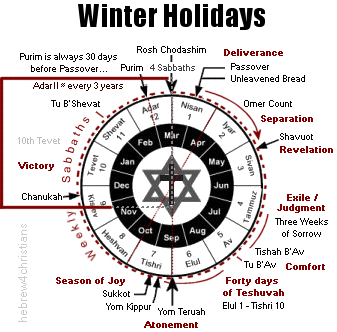|
Jewish Holiday Calendar
For February 2018 site updates, please scroll past this entry....
The winter holidays (חגי החורף) remember special times when God acted on behalf of His people so that they would triumph over their enemies, and therefore they prophetically picture the final victory in the world to come.
The Winter Holidays:
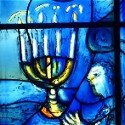
Note that in accordance with tradition, the following holiday dates begin at sundown:
- Month of Kislev Sat. Nov. 18th [eve] - Sun. Dec. 17th [day])
- Four Sabbaths: Vayetzei, Vayishlach, Vayeshev, Miketz
- Dates for Chanukah 2017 (5778):
- 1st Chanukah candle - Tues. Dec. 12th [i.e., Kislev 25]
- 2nd Chanukah candle - Wed. Dec. 13th
- 3rd Chanukah candle: Thur. Dec. 14th
- 4th Chanukah candle: Fri. Dec. 15th
- 5th Chanukah candle: Sat. Dec. 16th
- Month of Tevet (Sun., Dec. 17th [eve] - Tues. Jan. 16th [day])
- Four Sabbaths: Vayigash, Vayechi, Shemot, Vaera
- Dates for Chanukah (continued):
- 6th Chanukah candle: Sun. Dec. 17th (Rosh Chodesh Chanukah)
- 7th Chanukah candle: Mon. Dec. 18th
- 8th Chanukah candle: Tues. Dec. 19th [Zot Chanukah]
- Winter Solstice: Wed. Dec. 20th (Kislev 20)
- Christmas: Sunday, Dec. 24th at sundown (Tevet 7)
- Tenth of Tevet - Thur. Dec. 28th; daytime fast over the seige of Jerusalem
- Secular New Year: Mon. Jan. 1st, 2018 (Tevet 15)
- Month of Shevat (Tues., Jan. 16th [eve] - Wed. Feb. 14th [day])
- Month of Adar (Wed., Feb. 14th [eve] - Fri. March 16th [day])
- Month of Nisan (Fri., March 16th [eve] - Sat. April 14th [day])
Note: Some Jewish calendars list the first day of a holiday without indicating that the holiday begins sundown the night before... So, for example, while Purim begins Wednesday, February 28th at sundown, some calendars may indicate that it occurs on Thursday, March 1st...
February 2018 Updates
Note: If any page content appears to be missing, click: refresh the page...
Happy Purim, Chaverim!

[ The festival of Purim begins this evening at sundown... Happy Purim Chaverim! ]
02.28.18 (Adar 13, 5778) The Scriptures state that the holiday of Purim "should be remembered and kept throughout every generation, every family, every province, and every city; and that these days of Purim should not fail from among the Jews, nor the memorial of them perish from their seed" (Esther 9:28). According to Jewish tradition, we remember the miracles of Purim by means of four mitzvot (i.e., blessings): 1) Honoring the appointed time as directed by the Scriptures (Esther 9:26-28); 2) Performing acts of tzedakah and kindness (Esther 9:22; i.e., misloach manot: מִשְׁלוֹחַ מָנוֹת); 3) Hearing the Megillah of Esther read; and 4) Enjoying a special Purim meal together. The Midrash Esther says that Purim, unlike many of the other holidays, will be celebrated even after the final redemption after the End of Days. Maimonides says that the Book of Esther will enjoy the same status as the Torah of Moses in the world to come (Mishneh Torah, Megillah). This is because the story of Purim -- i.e., God's covenantal faithfulness and defense of His people -- will be magnified in the deliverance that leads to the establishment of the Messianic Kingdom upon the earth. Indeed, the Second Coming of the Messiah will be regarded as the final fulfillment of Purim (Rev. 19:11-16).
Purim is all about God's irrepressible, undefeatable, insuperable and sovereign love for His people. Though the wicked seem to sometimes have the upper hand in olam ha-zeh (this present hour), we need not fret or become anxious (Psalm 37:1, Prov. 24:19, Phil. 4:6). God is in control and His love and purposes overrule the counsel of the wicked. He will one day speak to the princes of this dark world in His wrath and terrify them in His fury (Psalm 2:5). God's great vision for Zion, the "City of the Great King," will never fail, friends, nor will His love for those who are trusting in Him. God's sovereign love is our great hope. As King David said, בָּרְכוּ־נָא אֶת־יהוה אֱלהֵיכֶם / Barekhu-na et-Adonai Elohekhem: "Now bless the LORD your God" (1 Chron. 29:20). פּוּרִים שָׂמֵחַ / Purim Sameach: "Happy Purim" chaverim!
 |
HAPPY PURIM CHAVERIM!
For more on the see the article: "Should Christians Celebrate Purim?"
Purim Ha'Gadol of Yeshua...

02.28.18 (Adar 13, 5778) Can you expound the essential meaning of the gospel in a single (and preferably short) sentence? How about "Yeshua the Messiah came into the world to save sinners" (1 Tim 1:15), or perhaps, "For our sake he made Him to be sin who knew no sin, so that in Him we might become the righteousness of God" (2 Cor. 5:21)? Of course "unpacking" the meaning of these sentences is where things get more difficult, but a succinct expression of faith can often provide us with a starting point...
"He himself bore our sins in his body on the tree, that we might die to sin and live to righteousness. By his wounds you have been healed" (וּבַחֲבֻרָתוֹ נִרְפָּא־לָנוּ). "For in him all the fullness (πᾶν τὸ πλήρωμα) of God was pleased to dwell, and through him to reconcile to himself all things, whether on earth or in heaven, making peace by the blood of his cross. And you, who once were alienated and hostile in mind, doing evil deeds, he has now reconciled in his body of flesh by his death, in order to present you holy and blameless and above reproach before him, if indeed you continue in the faith, stable and steadfast, not shifting from the hope of the message (εὐαγγέλιον) that you heard" (Col 1:19-23).
Here is another succinct statement of our deliverance: "For the Messiah also suffered once for sins, the righteous for the unrighteous (δίκαιος ὑπὲρ ἀδίκων), that he might bring us to God, being put to death in the flesh but made alive in the spirit" (1 Pet. 3:18). "And God is so rich in mercy (מָלֵא רַחֲמִים) and who loves us with such intense love (בְּרב אַהֲבָתוֹ אֲשֶׁר אָהַב אתָנוּ), even when we were dead because of our acts of disobedience, he brought us to life along with the Messiah- it is by grace that you have been delivered (בַּחֶסֶד נוֹשַׁעְתֶּם). That is, God raised us up with the Messiah Yeshua and seated us with him in heaven, in order to exhibit in the ages to come how infinitely rich is his grace, how great is his kindness toward us who are united with the Messiah Yeshua. For you have been delivered by grace through trusting, and even this is not your accomplishment but God's gift" (Eph. 2:4-8).
And of course there is always the old "stand by" verse of John 3:16:
כִּי־כֵן אהֵב אֱלהִים אֶת־הָעוֹלָם
עַד־אֲשֶׁר נָתַן בַּעֲדוֹ אֶת־בְּנוֹ אֶת־יְחִידוֹ
וְכָל־הַמַּאֲמִין בּוֹ לא־יאבַד
כִּי בוֹ יִמְצָא חַיֵּי עוֹלָם
kee-khen · o·hev · e·lo·heem · et-ha·o·lam,
ad-a·sher · na·tan · ba·a·do · et-be·no · et-ye·chee·do,
ve·khol-ha·ma·a·meen · bo · lo-yo·vahd
kee · vo · yeem·tza · cha·yei · o·lam

"For God so loved the world that he gave his only and unique Son,
so that whoever trusts in Him should not be destroyed, but have eternal life"
(John 3:16)

Hebrew Study Card
Here are a few other simplified expressions of our faith (I am sure you can come up with some others, chaverim): "He has freed us from our sins by his blood" (Rev. 1:5); "he that has the Son has life" (1 John 5:12); "Yeshua died for our sins, was buried, rose again on the third day, and forever reigns" (1 Cor. 15:3-4,25).
Let's push this approach a bit further. How about just four words?
Three words?
Can we find two words?
- "Messiah Crucified" (המָּשִׁיחַ הַנִּצְלָב);
- "Jesus Saves"
- "My help" (בְּעֶזְרָתִי)
Or how about just one word:
- Chesed / love (חֶסֶד)
- Abba (Father)
- Spirit (הָרוּחַ)
- Truth (הָאֱמֶת)
- Hope (תִקוָה)
- Messiah (הַמָּשִׁיחַ)
- Moshia - Savior (מוֹשִׁיעַ)
- King (הַמֶּלֶךְ)
- Jesus / Yeshua (יֵשׁוּעַ) - because whatever your need, the answer is found in Him.
Finally - dare I suggest it? - how about no words at all? To paraphrase Francis of Assisi, "Go into all the world and preach the gospel - and sometimes use words." Of course words are vitally important, but by themselves they are never enough, and sometimes they are even unnecessary (James 2:18)... There is a language of love ("the works of love") that goes beyond any diction the tongue may express. This is why the Name of the LORD always is something more than a mere word, concept, or idea... The Name of the LORD is God's love and power and glory and grace and kindness and mercy and passion as He Himself knows it to be real, true, and utterly invincible in all things...
פּוּרִים שָׂמֵחַ / Purim Sameach: "Happy Purim" chaverim!
Torah of Brokenness...
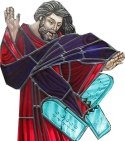
[ The following is related to our Torah reading this week, parashat Ki Tisa... ]
02.28.18 (Adar 13, 5778) "The LORD is the healer of the brokenhearted and the One who binds up their sorrows" (Psalm 147:3). It was only after Moses experienced brokenness and confession (prefigured by the shattering of the first set of tablets and the 40 days of teshuvah) that the inner meaning of God's Name (יהוה) was revealed as "mercy, grace, longsuffering, great in faithfulness, compassion," and so on (see Exod. 34:6-7). The passion of Moses prefigures the inner breaking necessary before the law of God can be "written upon the heart." As it is written of the New Covenant, "I will put my law within them, and I will write it on their hearts" (Jer. 31:33).
הָרפֵא לִשְׁבוּרֵי לֵב
וּמְחַבֵּשׁ לְעַצְּבוֹתָם
ha-ro·fei · lish·vu·rei ·lev
u'me·cha·besh · le'atz·tze·vo·tam

"He is the healer of the brokenhearted
and the One who binds up their sorrows."
(Psalm 147:3)

Download Study Card
The Revelation of God...
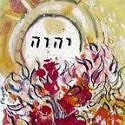
02.27.18 (Adar 12, 5778) When Moses asked the LORD, har'eini na et-kevodekha - "Please show me your glory" (Exod. 33:18), the sages said he wanted to reconcile God's supreme power and goodness despite the prevalence of evil in the world. God answered, "I will make all my goodness pass before you, and I will proclaim before you my name the LORD (יְהוָה)... but," he said, "you cannot see my face, for man shall not see me and live" (Exod. 33:19-20). The early sages interpret God's answer to mean that once we encounter God's goodness and love (defined by the essential name י־ה־ו־ה), we must trust that what is beyond our understanding nevertheless works for our ultimate good, even if its purpose may be unknown to us at the present time (Rom. 8:28). The LORD said both: "I will make my goodness manifest to you," and "you cannot see me and live," which means that we "see through a glass darkly" as we sojourn through this world (1 Cor. 13:12). God manifests yet still we can't fully see... In this life you may stand near God in the "cleft of the rock," on the very mountaintop of revelation, but you will still be in a cloud of unknowing (Exod. 33:22-23). Nevertheless God promises to "shelter you with his hand"; he will provide you a place of refuge and the strength to keep trusting despite incomprehensible times of testing.
For more on this topic, see: "The Revelation of God: Further thoughts on Ki Tisa."
Teshuvah of Hope...

02.27.18 (Adar 12, 5778) There are moments – dark, gnawing, raw – when you may lose sight of hope, when you might even fear that you have lost your faith – not in God or his promises (חַס וְחָלִילָה) – but rather in yourself, in your own strength to continue, to keep pressing on "hope against hope..." The remedy here is always the same: to remember that within you – that is, in your flesh - "there is no good thing" and that the miracle of salvation is made secure by God's passion for you, not your own power or desire. "Not by might, nor by power, but by my Spirit, saith the LORD of Hosts." We don't trust in ourselves nor in the strength of our inner resolve, but solely in the power of God to make the way. We must turn away from ourselves to regain the message of God's unfailing love; only when we lose sight of ourselves do we find ourselves. God redeems you from your lost estate and touches you in your uncleanness; He clothes himself in your pain so that you may be clothed in his love. That never changes, despite dark moments, and to that we must always return...
Where it says, "I can do all things through Messiah who strengthens me" (Phil 4:13), that includes not only being miraculously empowered by God to do his will despite your afflictions and disabilities, but also being healed of the inner pain of rejection, abandonment, and even from abuse suffered from childhood. It means being set free from disillusionment, despair, and the oppression of relentless fear. "I can do all things through Messiah" means no longer accepting messages of self-hatred, no longer heeding the malicious whispers that say: "I am of no value," "I am unlovable," "my life is hopeless." No, "I can do all things through Messiah" means learning to be accepted, honored, and esteemed by God; it means opening your heart to God's love and blessing for your life; it means allowing your heart to be made right, to have inner peace... After all, Yeshua's great prayer was that we would know the truth of God's love for us (John 17), and this is the central need our lives...
"Purim" in the Messiah...
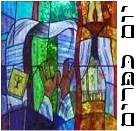
[ The holiday of Purim begins Wednesday, February 28th at sundown this year... ]
02.26.18 (Adar 11, 5778) On Purim we remember how the Jewish people escaped from Haman's evil plot to destroy them, though any day that is marked by special deliverance by God may be regarded as a "personal" or "special" Purim. Therefore some Jewish families and communities celebrate "special purims" to commemorate the anniversary of a particular deliverance. The most important deliverance we have comes from being set free from the guilt of our sins, of course, since this gives us true peace with God (Rom. 5:1,11). In fact, Yom Kippur (the Day of Atonement) is also known as Yom Kippurim in the Tanakh, which can be read as Yom Ke-Purim (i.e., יוֹם, "a day" + כְּ, "like" + פֻּרִים, "Purim"). Thus the day on which Yeshua sacrificed Himself on the cross is the greatest Purim of all, since through His loving intervention we are eternally delivered from the hands of our enemies. Yehi shem Adonai mevorakh: "Blessed be the Name of the Lord."
Hidden and in Plain Sight...

[ The festival of Purim begins Wednesday, February 28th at sundown this year... ]
02.26.18 (Adar 11, 5778) Although the Name of God (שם המבורש) is not explicitly mentioned in the Scroll of Esther (מגילת אסתר), the story is essentially about revelation, that is, the disclosure of God's Presence despite His apparent concealment. The phrase hester panim (הֶסְתֵר פָּנִים) means "hiding of face" and is often used when discussing the divine providence. God's plan is being fulfilled, step-by-step, even if it is hidden within the "natural" world of human beings and their choices (Jer. 10:23; Prov. 21:1). The LORD is Ha'mashgiach (i.e., הַמַּשְׁגִיחַ, the supervisor) of all things - from the motions of subatomic particles to the great events of the cosmos. He not only calls each star by its own name (Psalm 147:4), but knows each particular lily and sparrow (Matt. 6:28-30, 10:29). Indeed, each person is under the direct, personal supervision of God Himself (i.e., hashgachah pratit: הַשְׁגָּחָה פְּרָטִית) -- whether he or she is conscious of this or not. As our Lord Yeshua said, even the hairs on your head are all numbered (Matt. 10:30).
גָּדוֹל יְהוָה וּמְהֻלָּל מְאד
וְלִגְדֻלָּתוֹ אֵין חֵקֶר
gah·dohl · Adonai · oo·me·hool·lahl · me·ohd
ve·leeg·doo·lah·toh · ein · che·ker

"Great is the LORD, and greatly to be praised,
and his greatness is unsearchable"
(Psalm 145:3)

Download Study Card
The Apostle Paul taught that God "chose us [εκλεγομαι] in the Messiah before the foundation of the world" (Eph. 1:4). God called you by name -- before He created the very universe itself. "God has chosen you from the beginning for salvation through sanctification by the Spirit and faith in the truth" (2 Thess. 2:13). God loves you with an "everlasting love" (אַהֲבַת עוֹלָם) and with lovingkindness (i.e., chesed, חֶסֶד) draws you to Himself (Jer. 31:3). There is no fear in God's sovereign and irresistible love for your soul (1 John 4:18). "If God is for us, who can be against us?" (Rom. 8:31).
For more on this topic, see "Theology, Paradox, and Purim."
Parables and Purim...
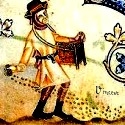
[ The festival of Purim begins Wednesday, February 28th at sundown this year... ]
02.26.18 (Adar 11, 5778) The Hebrew word for "parable" is mashal (מָשָׁל), which means a "likeness" or "similitude," though it also can refer to a proverb or ethical maxim (as in the case of Mishlei Shlomo, the Proverbs of Solomon). In the New Testament, the word παραβολή means juxtaposition, or the casting (βάλλω) of one thing beside (παρα) another thing for the purpose of comparison or contrast. Figuratively, a parable resembles the shape of a parabola, that is, a "u-shaped curve" that goes out and turns back in on itself. Hence the parables of Jesus generally have a "twist" that is meant to turn the hearer back to question his or her own perspective, heart attitude, and so on. The purpose of the parable is to provoke us think outside of our prejudices so that we can see divine possibility in our lives.
Undoubtedly Yeshua often taught in parables because they simultaneously conceal and reveal the truth. A parable obscures the truth to those who don't really want it; just as it reveals the truth to those who do (Luke 8:9-10). Since Yeshua's whole life was a parable of sorts - a "disguise" that led to the victory of our deliverance (Phil. 2:7) - it is not surprising that he regularly used "figures of speech" to provoke people to examine their own heart attitude and faith... In this connection note that Yeshua never explained the "mysteries of the kingdom of God" directly to the crowds, nor did He ever pander to the crowd's clamor or interests. His message is always meant for the individual soul who was willing to follow Him -- to the one who had "ears to hear."
"As you go about, let people know that the Kingdom of Heaven (מַלְכוּת הַשָׁמַיִם) has come. Take care of the sick, waken the lifeless, forgive the sinner, and banish the demonic" (Matt. 10:7-8). We proclaim the truth of the kingdom when we serve as healers, caregivers, and those who seek to bring the grace of God and inner peace to others.. "Go into all the world and preach the gospel, and sometimes use words..."
Note: For more on this topic, see the Purim article, "Parables and Revelation."
Parashat Ki Tisa - כי תשא

02.25.18 (Adar 10, 5778) Our Torah reading for this week is Ki Tisa, one of the longest of the entire Torah. It includes the tragic account of the Sin of the Golden Calf (עֵגֶל מַסֵּכָה) and Moses' passionate intercession for Israel. After a period of teshuvah (repentance) for Israel's idolatry, the LORD graciously revealed the meaning of the Name YHVH (יהוה), that is, the thirty-two words that have become known in Jewish tradition as the Shelosh Esrei Middot, or the "Thirteen Attributes of God's Mercy." This was the LORD's own definition of His character and attributes to Moses after the breaking of the Sinai covenant. See the Ki Tisa Summary for the Hebrew text and audio of this vital revelation from God.
זָרַח בַּחשֶׁךְ אוֹר לַיְשָׁרִים
חַנּוּן וְרַחוּם וְצַדִּיק
za·rach · ba·cho·shekh · ohr · lai·sha·rim
chan·nun · ve·ra·chum · ve·tzad·dik

"Light dawns in the darkness for the upright;
He is gracious, merciful, and righteous."
(Psalm 112:4)
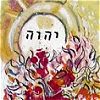
Download Study Card
Recall that in our last two Torah readings (i.e., Terumah / Tetzaveh), we read how Moses was upon Mount Sinai receiving the vision of the Sanctuary (i.e., the Mishkan or "Tabernacle") and its various furnishings. In this week's portion, God commanded that all Israelite men over the age of twenty were required to pay a tax for the upkeep of the Sanctuary: "each shall give (וְנָתְנוּ) a ransom (i.e., kofer: כּפֶר) for his life to the LORD" (Exod. 30:12). The sages note that the word ve'natnu can be written backward and forward, alluding to the idea that whoever gives tzedekah (i.e., "charity") never feels the loss of having given anything away (Bava Batra). Giving benevolence produces wealth; tzedakah is an investment in your spiritual future! Indeed, "charity saves from death" - tzedakah hatzil mi-mavet: / צְדָקָה תַּצִּיל מִמָּוֶת (Prov. 10:2; 11:4). The love of God is like that: when we give it away, it becomes our own possession. The converse is also true. If we withhold helping others, eventually we may be unable to give what we would have given had we the opportunity (and consequently, we lose our blessing). In this age of economic fear, giving tzedakah is truly countercultural and faith-affirming: but the truth abides: when we give, we receive....
After this tax was defined, the LORD described some additional elements that would be required for the priestly service at the Sanctuary, namely, a copper washstand, sacred anointing oil, and incense for the Golden Altar in the Holy Place. The Lord then named Betzalel, a man "filled with the Spirit of God" to be the chief architect of the Mishkan. Before the construction would begin, however, the Lord warned the people to be careful to observe the Sabbath day. Immediately following this admonition, God gave Moses the two tablets of the Ten Commandments, which were inscribed directly by the hand of God.
Before Moses returned to the camp, however, "certain people" had talked his brother Aaron into making a golden idol which they began to worship as their "god." The LORD then told Moses of their treachery and threatened to destroy all the Israelites, but Moses interceded on their behalf. As he rushed down the mountain, with the tablets in hand, he saw the people dancing about the idol and smashed the Tablets in anger. Moses then destroyed the idol and led the Levites in slaying 3,000 of the ringleaders.
The following day, Moses returned up the mountain and begged God to reaffirm the covenant. After a 40 day period of intercession, the Lord finally told Moses to carve a second set of Tablets and to meet him again at the summit of Sinai, where He would show Moses his glory and reveal to him the meaning of His Name (יהוה). When Moses encountered the LORD in a state of brokenness and forgiveness, his face began to shine with glory - a glory that foretold of the New Covenant of God's mercy and grace to come in Yeshua.
When the people saw Moses coming down the mountain with the second set of Tablets, they understood they were forgiven and that the Covenant had been renewed. When they approached him, however, they drew back in fear, because his face was radiant with the glory of God. Moses reassured them, however, and then told them all that the Lord had commanded while he was on the mountain. When Moses had finished speaking with them, he put a veil (מַסְוֶה) over his face. From that time on, Moses wore a veil in the camp, though he removed it whenever he went before the Lord for further instructions.
Moses and Messiah...
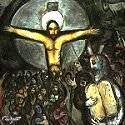
02.23.18 (Adar 8, 5778) Though Moses is of course a central character in the Book of Exodus, and indeed of the entire Torah, it is noteworthy that he is not mentioned even once in our Torah reading this week (i.e., Tetzaveh, meaning "you shall connect!") – a conspicuous absence! The focus shifts away from the social laws of Israel to the realm of the priests: how they should dress, how they should serve God, and so on. Notice how the great vision of the altar extends beyond the legislative aspects of the Torah... Therefore Yeshua said that Abraham rejoiced to see his day, and that Moses wrote of him (see John 8:56; John 5:46, Luke 24:27). Moses wrote of the Messiah directly, of course (e.g., Gen. 22:8, 49:10; Deut 18:15; etc.), though more often he wrote of him indirectly, in the "white spaces of the scroll," so to speak. For instance, God ordained that the sacrifice of the Passover lamb was to be commemorated every evening and morning, along with matzah and wine, as the central sacrifice of the Tabernacle (see Exod. 29:38-42 and Num. 28:1-6), athe "korban tamid" ritual that foreshadowed the advent of Yeshua, the Great Lamb of God (שֵׂה הָאֱלהִים) who would provide our everlasting atonement (John 1:29).
Note: If the law represents the "Tree of the Knowledge of good and evil" (note, not just knowledge of evil, but of both good and evil), then the remedy is found by partaking of the Tree of Life (עֵץ הַחַיִּים), which was also "in the midst" of the garden (בְּתוֹךְ הַגָּן) but was separate from it (Gen. 2:9). Likewise God gave the moral law at Sinai and at the same time gave the vision of the altar, the "life-for-life" exchange that overcame the demands of the moral law by sacrificial love... The Tree of Life is Messiah, who fulfills the demands of the law on our behalf and heals us from our separation from God (Rev. 22:2).
Hiddenness and Disclosure...

[ The holiday of Purim occurs this coming Wednesday, February 28th (at sundown) and runs through the following day. In anticipation of the coming holiday, then, let me wish you and your family "Purim Sameach" (פורים שמח) -- with the prayer that you will stand true to your faith, despite this wicked world and its syncretizing influences. ]
02.23.18 (Adar 8, 5778) The sages extol the importance of the holiday of Purim because it reveals the hidden hand of God, despite his apparent absence in the affairs of this world... On the surface, each turn of the story could be explained naturally, or as simple "coincidence," yet in the end we realize that God was at work behind the scenes, carefully putting together deliverance for God's people. The eye of faith trusts in God's providential plan, despite appearances to the contrary. Indeed, the phrase hester panim (הֶסְתֵר פָּנִים) means "hiding of the face" and is often used when discussing the Book of Esther. Understood as hidden providence, hester panim is somewhat like the sun on an overcast day: Just because you don't see it doesn't mean it isn't there. God's great love is at work at all times, in all affairs of the universe, whether we perceive it or not.
Note: Some have wondered if there is a connection between Purim and the Urim and Thummim (האורים והתומים, "lights and perfections") mentioned in our study of parashat Tetzaveh. The Hebrew word purim (פוּרִים) is the plural of pur (פּוּר), meaning "lot" (to be distinguished from goral (גּוֹרָל) the usual term). Urim (אוּרִים) meaning "lights" comes from a different root (i.e., אוֹר), so there is no semantic connection between the words, though there is possibly a connection between the Urim and Thummim and the Menorah to irradiate the avnei chosen (gems on the High Priest's breastplate of judgment) as mentioned in our parashah study of Tetzaveh....
Note also that Queen Esther's Jewish name was Hadassah (הֲדַסָּה), derived from hadas (הֲדַס), meaning "myrtle" (i.e., an evergreen shrub) that has an ancient association with healing (hadas is also a branch of myrtle that forms part of the lulav used during Sukkot). The name Esther (אֶסְתֵּר), on the other hand, may derive from the Persian word for "star" or may come from the Babylonian pagan fertility idol named "Ishtar" (an idol that inspired the invention of "Venus"). The English word "Easter" (and its derivatives) also derive from the same root.
Don't give up, ever...

02.23.18 (Adar 8, 5778) Keep the flame within your heart burning, friend... A sage once told a person struggling with his faith: "It is written that all creation was brought into being because of people like you. God saw there would be people who would cling to our holy faith, suffering greatly because confusion and doubt would plague them. God perceived that such would overcome these doubts and troubles of heart and remain strong in their belief. It was because of this that God brought forth all creation." Indeed, it was because of this that Yeshua our LORD suffered and died for you... Amen. Therefore never yield to despair, since that leads to further darkness and fear. Press on and keep fighting the "good fight" of faith (1 Tim. 6:12). Remember that you infinitely matter to heaven; your life has great value; you are significant and you are truly loved by our Heavenly Father. There is a "future and a hope" for you; there is "a white stone, and on that stone will be written a new name that no one can understand except the one who receives it" (Rev. 2:17). May "the trial of your faith, being much more precious than of gold that perishes, though it be tested with fire, be found to result in praise and glory and honor at the revelation to come" (1 Pet. 1:7).
כִּי אָנכִי יָדַעְתִּי אֶת־הַמַּחֲשָׁבת
אֲשֶׁר אָנכִי חשֵׁב עֲלֵיכֶם נְאֻם־יְהוָה
מַחְשְׁבוֹת שָׁלוֹם וְלא לְרָעָה
לָתֵת לָכֶם אַחֲרִית וְתִקְוָה
ki · a·no·khi · ya·da·ti · et · ha·ma·cha·sha·vot
a·sher · a·no·khi · cho·shev · a·lei·khem · ne·um · Adonai
mach·she·vot · sha·lom · ve·lo · le·ra·ah
la·teit · la·khem · a·cha·rit · ve·tik·vah

"For I know the plans that I have for you, declares the LORD,
plans for blessing and not for evil, to give you a future and a hope."
(Jer. 29:11)

Hebrew Study Card
"I am sure of this, that he who began a good work in you will bring it to completion (ἐπιτελέω) at the Day of Yeshua the Messiah" (Phil 1:6). The LORD is able to guard you (φυλάξαι) from stumbling and to present you blameless before the presence of His glory with great joy (Jude 1:24). "The LORD upholds all who are falling and raises up all who are bowed down" (Psalm 145:14). "He will sustain you to the end, guiltless in the Day of our Yeshua the Messiah" (1 Cor. 1:8). He who calls you is forever faithful; He will surely do it (1 Thess. 5:24). Yea, "the Lord is faithful (נֶאֱמָן הוּא): He will establish you and guard you against the evil one" (2 Thess. 3:3). The Spirit says, "Fear not, for I AM with you always."
Lights and Perfections...

[ The following is related to this week's Torah reading, parashat Tetzaveh... ]
02.23.18 (Adar 8, 5778) The High Priest's breastplate contained a pouch holding two mysterious gemstones called the "Urim and Thummim" (אוּרִים וְתֻמִּים), usually translated "lights and perfections." According to the Targum Jonathan, when a matter was brought to the High Priest for settlement, he would sometimes hold these before the Menorah and the Shekhinah would refract and irradiate various letters inscribed on the stones of the breastplate to reveal the will of God. Other sages, however, have said these stones were like lots (purim) used to get "yes/no" responses from the LORD (e.g., 1 Sam. 14:41, 28:6, Ezr. 2:63; Neh. 7:65). Note that the word "urim" begins with the letter Aleph (א), the first letter of the alphabet, and the word "thummim" begins with Tav (ת), the last letter, which suggests the words of Yeshua: "I AM the Aleph and the Tav (אָנכִי אָלֶף וְתָו), the Beginning and End (רִאשׁוֹן וְאַחֲרוֹן), the First and the Last" (Rev. 22:13). Our holy Scriptures declare that in these last days God has spoken to us "by his Son, whom He appointed the Heir of all things, through whom also He created the worlds" (Heb 1:2). Note that the Greek construction for the phrase translated, "by his son" is ἐλάλησεν ἡμῖν ἐν υἱῷ, which literally means "he spoke to us in Son" -- that is, in the language or voice of the Son of God Himself... God speaks in the language "of Son" from the midst of the fire revealed at Zion.
Of course we do not discern the will of God using these methods any longer, since the veil of the Holy of Holies has been removed (Matt. 27:51), and we have access to the Throne of Grace to speak with God as if panim el-panim (פָּנִים אֶל־פָּנִים), "face to face." Referring to Yeshua as our High Priest of the New Covenant it is said: "For we do not have a high priest who is unable to sympathize with our weaknesses, but one who in every respect has been tempted as we are, yet without sin. Let us then with confidence draw near to the throne of grace, that we may receive mercy and find grace to help in time of need" (Heb 4:14-15).
"Therefore, since we have confidence to enter the holy places by the blood of Yeshua, by the new and living way that he opened for us through the curtain, that is, through his flesh, and since we have a great priest over the house of God, let us draw near with a true heart in full assurance of faith, with our hearts sprinkled clean from an evil conscience and our bodies washed with pure water. Let us hold fast the confession of our hope without wavering, for he who promised is faithful." (Heb. 10:19-23)
Shabbat Shalom friends, and may we come boldly before the Throne of Grace to share our heart with our Heavenly Father this very day...
Intercession and Incense...
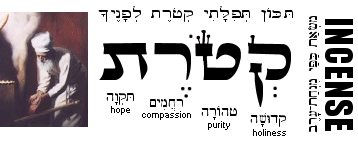
[ The following is related to this week's Torah reading, parashat Tetzaveh... ]
02.23.18 (Adar 8, 5778) The final item described in the Mishkan (i.e., the "Tabernacle") was a golden "altar of incense" (מִזְבַּח הַקְּטרֶת) that was to be placed in the Holy Place just before the veil separating the Holy of Holies. Every morning and evening the High Priest would burn sacred incense on this altar (symbolizing his prayer and intercession), and the blood of atonement was also applied there during the Yom Kippur service (Exod. 30:6-10). The sages say that the word "incense" – i.e., ketoret (קְטרֶת) – can be thought of as an acronym of the words kedushah (קְדוּשָׁה), "holiness," tahorah (טָהֳרָה), "purity," rachamim (רַחֲמִים), "compassion," and tikvah (תִקוָה), "hope," characteristics that marked the passion of Yeshua who interceded for us as he offered his blood before the heavenly kapporet as our High Priest of the new covenant. Indeed, the word ketoret comes from a root word (קטר) that means to offer sacrifice, further alluding to the intercession of Messiah on our behalf (Heb. 7:25). Disciples of Yeshua are likewise called priests of God (Rev. 1:6; 1 Pet. 2:5), and our prayers and service are regarded as a "sweet-smelling savor" offered to the Lord (Rev. 8:4). As it says in the Psalms: "Let my prayer be counted as incense before You; the lifting up of my hands as the evening sacrifice."
תִּכּוֹן תְּפִלָּתִי קְטרֶת לְפָנֶיךָ
מַשְׂאַת כַּפַּי מִנְחַת־עָרֶב
ti·kon · te·fil·la·ti · ke·to·ret · le·fa·ne·kha
ma·sat · ka·pai · min·chat · a·rev

"Let my prayer be counted as incense before You;
the lifting up of my hands as the evening sacrifice."
(Psalm 141:2)

Note: The Talmud states that the sacred incense recipe was made of eleven different spices, ten of which had pleasant fragrance, but one of which (i.e., galbanum) had an unpleasant odor. The sages explain that that the word for "community" in Hebrew (i.e., tzibbur: צִבּוּר) may be understood as an acronym for tzaddikim (צַדִּיקִים), "the righteous," be'nayim (בֵּינַיִם), "the intermediate," and resha'im (רְשָׁעִים), "the wicked," and that the presence of galbanum makes place for the transgressors... The presence of an unpleasant odor in the sacred mixture represents our laments, our cries, and confession for the foulness of our sins.
How Long, O Lord?

02.23.18 (Adar 8, 5778) The last promise of Scripture is "I come quickly" (Rev. 22:20), and the last prayer is the antiphon: "Amen, come, Lord Yeshua." Meanwhile we "inwardly groan" for the fulfillment of our redemption: we are suspended between worlds, walking in hope yet subject to the same vanities that befall all flesh. This reminds me of the old story of the Maggid of Brisk who each year would bring proof from the Torah that the Messiah would come that year. Once a certain Torah student asked him, "Rabbi, every year you bring proof from the Torah that the Messiah must come that year, and yet he does not come. Why bother doing this every year, if you see that Heaven ignores you?" The Maggid replied, "The law states that if a son sees his father doing something improper, he is not permitted to rebuke him but must say to him, 'Father, the Torah states thus and so.' Therefore we must tell God, who is our Father, that by keeping us in long exile, he is, in a sense, causing injustice to us, and we must point out, "thus and so it is written in the Torah," in hope that this year he might redeem us." This same principle, of course, applies to those of us who are living in exile and who eagerly await the second coming of the Messiah Yeshua. We should continue asking God to send Him speedily, and in our day, chaverim...
חוּשָׁה לְעֶזְרָתִי אֲדנָי תְּשׁוּעָתִי
chu·sah le·ez·ra·ti Adonai te·shu·a·ti

"Make haste to help me, O Lord, my salvation"
(Psalm 38:22)

Although God sometime tarries, He declares, "I am the LORD; in its time I will hasten it" (Isa. 60:22). But still the heart sighs, "Is it time, LORD? Will you now restore the kingdom to Israel?" But as Yeshua said, "It is not for you to know times or seasons that the Father has fixed by his own authority" (Acts 1:6-7). We are left waiting for ultimate God's answer: His glorious coming to fulfill our salvation. Meanwhile God is faithful "to keep you from falling, and to present you faultless before the presence of his glory with exceeding joy" (Jude 1:24). God will help us before He will help us. May He come speedily, and in our day. Amen.
Fortunes of Affliction...
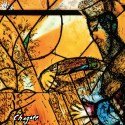
02.23.18 (Adar 8, 5778) I know many of you are in pain, struggling to hang on to hope, waiting for the fulfillment of the promise of your salvation given in Yeshua. Suffering is sometimes so difficult because it can seem senseless... Besides the shock of various "big" sufferings that come our way, we often face smaller, even petty, ones - the heaviness and drain of chronic affliction and the banality of ongoing pain. Sometimes it seems the world is drowning in tears and my heart feels like it will break. Whenever I feel this way I need to remember the words of King David:
אַשְׁרֵי הַגֶּבֶר אֲשֶׁר־תְּיַסְּרֶנּוּ יָּהּ
וּמִתּוֹרָתְךָ תְלַמְּדֶנּוּ
ash·rei ha-ge·ver ash·er te'ya·se·re·nu Yah,
u'mi-to·ra·te·kha tal·me·de·nu

"Fortunate is the person whom You afflict, LORD;
You teach him from Your Torah."
(Psalm 94:12)

Notice that this verse says that yissurim (suffering) is a blessing for those who are being taught by God, since it leads to "sheket," quietness from days of evil (see v.13). I need to consciously remember that God's providential hand is in everything for good: gam zu l'tovah (גַּם זוּ לְטוֹבָה), "this too is for the best." I affirm that God is loving and wonderfully gracious and will use all things - even "this momentary affliction" to for work a surpassing greatness (ὑπερβολή) and eternal weight of glory" (2 Cor. 4:17).
Suffering is a mystery, perhaps the oldest mystery next to sin itself. The whole world "groans" because of tza'ar ba'elei chayim, "the pain of all living creatures" (Rom. 8:22). The idea that we cannot fathom why the wicked appear to prosper while the righteous suffer can be summed up as "ein be'yadeinu," it is not within our hands to understand... And yet like King David we trust that God uses affliction in our lives for good. The heartache that comes from groaning or longing for God's righteousness to be fulfilled is sometimes called yissurei ahavah – "the troubles of love." Yeshua is the Master teacher of what it means to patiently suffer for the sake of God's love. May He give you consolation and comfort even today...
The Eternal Light...
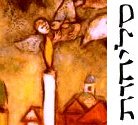
02.22.18 (Adar 7, 5778) Tetzaveh begins with the commandment to kindle the light of the menorah and to keep its light shining: "You shall command the people of Israel to bring pure beaten olive oil beaten for the light, for a lamp that may be lifted up to shine forever" (Exod. 27:20). The purest oil is essential – oil "beaten for the light" (כָּתִית לַמָּאוֹר) – which symbolizes the poured out life of the Suffering Servant and his ascended glory for us. We are to follow this light regardless of circumstances. Life has its ups and downs, we may experience troubles and hardship, yet here is a constant light (i.e., ner tamid:נֵר תָּמִיד) that provides comfort and direction, illuminating our way. The light reveals our inner life with God: ner Adonai nishmat adam, chofes kol chadrei vaten: "The spirit (i.e., neshamah, breath of God, inner consciousness, conscience, etc.) of a person is the light of the LORD, revealing the inmost heart" (Prov. 20:27). Amen. Yechoneinu yivarekheinu ya'eir panav itanu: "May God be gracious to us and bless us, shining the light of His countenance upon us" (Psalm 67:1).
When our eyes are open to the unchanging light of God, our hearts will cry out: Mah nora ha'makon ha'zeh: "How awesome is this place. This is none other than the house of God, and this is the gate of heaven" (Gen. 28:17). Admat kodesh hu – "this is holy ground (Exod. 3:5).
Note: Please pray for Hebrew for Christians, friends. I've been experiencing a lot of technical issues with the website lately and it appears that several attempts have recently been made to crash the site via hacking, etc. Thank you so much.
Purim and Prophecy...

[ The following concerns the festival of Purim, which begins February 28th at sundown... ]
02.22.18 (Adar 7, 5778) Both Chanukah and Purim are holidays that celebrate God's victory over the forces of darkness... Just as the prophet Daniel foresaw the events of Chanukah, that is, the rise of "Epihpanes," the "Messiah of Evil" who will one day attempt to "assimilate" all of humanity into a "New World Order" (Dan. 9:27, 2 Thess. 2:3; Rev. 13:7-9, etc.), so Purim foretells how this wicked one will attempt to destroy the Jewish people during the End of Days (אַחֲרִית הַיָּמִים), though he will be destroyed by his own wicked devices. The Midrash Esther says that Purim, unlike many of the other holidays, will be celebrated even after the final redemption after the End of Days. This is because the story of Purim -- i.e., God's covenantal faithfulness and defense of His people -- will be magnified in the deliverance that leads to the establishment of the Messianic Kingdom upon the earth. Indeed, the Second Coming of the Messiah will be regarded as the final fulfillment of Purim! So while it is a often seen as time of unbridled celebration in Israel (ad lo yoda), the holiday of Purim has a very sober prophetic message that foretells the glorious end of this age.
Here is a vision of the coming "Purim haGadol," the great deliverance:
Then I saw heaven opened, and behold, a white horse! The one sitting on it is called Faithful and True (נֶאֱמָן וְיָשָׁר), and in righteousness he judges and makes war. His eyes are like a flame of fire, and on his head are many diadems, and he has a Name written that no one knows but himself. He is clothed in a robe dipped in blood, and the Name by which he is called is the Word of God (דְּבַר הָאֱלהִים). And the armies of heaven, arrayed in fine linen, white and pure, were following him on white horses. From His mouth comes a sharp sword with which to strike down the nations, and He will rule them with a rod of iron. And He will tread the winepress of the fierce fury of the wrath of God, the Ruler over All (παντοκράτωρ), the LORD God Almighty (יְהוָה אֱלהֵי צְבָאוֹת). On his robe and on his thigh he has a Name written, the King of kings (מֶלֶךְ הַמְּלָכִים) and the Lord of lords (אֲדנֵי הָאֲדנִים). And with the breath of his lips He will slay the wicked. - Rev. 19:11-16
May that day come speedily, and in our time...
HAPPY PURIM CHAVERIM!
Oil of Illumination...
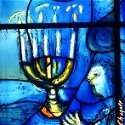
[ The following is related to this week's Torah reading, parashat Tetzaveh... ]
02.21.18 (Adar 6, 5778) Again from our Torah portion this week (i.e., Tetzaveh) we read: "You shall command the people of Israel that they bring to you pure olive oil "crushed" for the light, that an eternal lamp (נֵר תָּמִיד) may be set up to burn" (Exod. 27:20). The Hebrew word for "pure" olive oil is zakh (זָךְ), which refers to the clearest oil derived from squeezing out (or crushing) the very first drop from the choicest olive. The purest of oil was obtained by a process of "crushing for the light" (כָּתִית לַמָּאוֹר), which symbolizes the Light of the World, the One Crushed for our iniquities, the "Man of Sorrows" (אִישׁ מַכְאבוֹת) who offered himself up for our healing and illumination (Isa. 53:1-5). Some things are seen only through the process of tribulation, breaking, and surrender. When we kindle this lamp, we are able to see the truth; we perceive how God's heart was crushed for the sake of our salvation...
Purim and Prophecy...

[ The following concerns the festival of Purim, which begins February 28th at sundown... ]
02.21.18 (Adar 6, 5778) Both Chanukah and Purim are holidays that celebrate God's victory over the forces of darkness... Just as the prophet Daniel foresaw the events of Chanukah, that is, the rise of "Epihpanes," the "Messiah of Evil" who will one day attempt to "assimilate" all of humanity into a "New World Order" (Dan. 9:27, 2 Thess. 2:3; Rev. 13:7-9, etc.), so Purim foretells how this wicked one will attempt to destroy the Jewish people during the End of Days (אַחֲרִית הַיָּמִים), though he will be destroyed by his own wicked devices. The Midrash Esther says that Purim, unlike many of the other holidays, will be celebrated even after the final redemption after the End of Days. This is because the story of Purim -- i.e., God's covenantal faithfulness and defense of His people -- will be magnified in the deliverance that leads to the establishment of the Messianic Kingdom upon the earth. Indeed, the Second Coming of the Messiah will be regarded as the final fulfillment of Purim! So while it is a often seen as time of unbridled celebration in Israel (ad lo yoda), the holiday of Purim has a very sober prophetic message that foretells the glorious end of this age.
Here is a vision of the coming "Purim haGadol," the great deliverance:
Then I saw heaven opened, and behold, a white horse! The one sitting on it is called Faithful and True (נֶאֱמָן וְיָשָׁר), and in righteousness he judges and makes war. His eyes are like a flame of fire, and on his head are many diadems, and he has a Name written that no one knows but himself. He is clothed in a robe dipped in blood, and the Name by which he is called is the Word of God (דְּבַר הָאֱלהִים). And the armies of heaven, arrayed in fine linen, white and pure, were following him on white horses. From His mouth comes a sharp sword with which to strike down the nations, and He will rule them with a rod of iron. And He will tread the winepress of the fierce fury of the wrath of God, the Ruler over All (παντοκράτωρ), the LORD God Almighty (יְהוָה אֱלהֵי צְבָאוֹת). On his robe and on his thigh he has a Name written, the King of kings (מֶלֶךְ הַמְּלָכִים) and the Lord of lords (אֲדנֵי הָאֲדנִים). And with the breath of his lips He will slay the wicked. - Rev. 19:11-16
May that day come speedily, and in our time...
HAPPY PURIM CHAVERIM!
Tetzaveh and Purim...

02.21.18 (Adar 6, 5778) Our Torah reading this week (Tetzaveh) begins with instructions for kindling the holy lampstand: "command the people of Israel to bring to you pure beaten olive oil for illumination (לַמָּאוֹר) to offer up (olah) a continual lamp (נֵר תָּמִיד)." Note that the word translated "lampstand" is menorah (מְנוֹרָה), from the word for lamp, ner (נֵר). What's interesting about this verse is that the commandment to "offer up a continual lamp" occurs before the Tabernacle - and the menorah - was even made. God's Light must shine first -- even before we can direct our worship to Him.... The Light of His Presence precedes even the "tent of meeting" itself.
There is a Purim connection here. Perhaps you are familiar with the "Urim and Thummim," the "lights and perfections" that the High Priest sometimes used to discern messages from the LORD? Some scholars believe these were like lots (purim) that were used to get "yes/no" responses from the LORD (e.g., 1 Sam. 14:41, 28:6, Ezr. 2:63; Neh. 7:65). When Haman the Agagite kept "rolling the dice" until he found the "propitious" time to seek the destruction of the Jews (Esther 3:7), God was indeed watching. After Haman "divined" the twelfth month (Adar), he appealed to the King to put his hateful plan into action... He slandered the Jews and sought to incite the King's anger against them as traitors who pledged allegiance to a different King... All this was foreseen by the LORD and under His sovereign control. Little did Haman know that the dice he cast was for the appointed day of his own death. And so it goes for all those who "cast the lot" without understanding the overarching sovereignty of God...
For more on this subject see the article: "Parashat Tetzaveh and Purim."
Priests of His Light...

02.20.18 (Adar 5, 5778) Our Torah for this week (Tetzaveh) describes the ceremony of consecration to the priesthood. We are chosen to be a "kingdom of priests," a set-apart people, and a light to the nations (Exod. 19:6; Isa. 42:6; 1 Pet. 2:9). Note the very first responsibility given to the priests was to care for the ner tamid (נר התמיד), the light of the Menorah (Exod. 27:20-21), which represents our consciousness of the Divine Presence (Psalm 18:28; 36:9). The challenge we all face is to remain "in the light as God is in the light" and not to be seduced by the world of fleeting appearances (Isa. 2:5; 1 John 1:7, 2:17). God's eternal light radiates through all things (Isa. 6:3; Psalm 139:11-12), just as the great "yehi ohr" (יְהִי אוֹר) - "Let there be light" - is the first word spoken to creation (Gen. 1:3). To be a priest means being so filled with the truth that you radiate peace; your inner light shines and you glorify your Father in heaven (Matt. 5:16). That is how we draw others to the truth, by receiving the beauty of the LORD (Psalm 27:4). May we let our light so shine that our heavenly Father is glorified (Matt. 5:16; Matt. 6:22; Isa. 60:1). Amen.
Of course being a "witness to the light," that is, being a "priest," does not mean you are a "perfect person" who walks about with a blissed-out attitude despite the various trials and tests we all face in this life. No, we all still sin, and we therefore need to confess the truth of our condition to abide in the light (1 John 1:9; James 5:16). Like everything else in Scripture, here we encounter paradox, as Yeshua taught: "Blessed are the impoverished in spirit (πτωχοὶ τῷ πνεύματι), for theirs is the kingdom of heaven; blessed are the ones who mourn (οἱ πενθοῦντες), for they shall be comforted; blessed are the meek (οἱ πραεῖς), for they shall inherit the earth" (Matt. 5:3-5). Yea, "God chose what is foolish in the world to shame the wise; God chose what is weak in the world to shame the strong, God chose what is low and despised in the world, even things that are not, to bring to nothing things that are, so that no human being might boast in the presence of God" (1 Cor. 1:27-29).
The Hebrew word for priest (i.e., kohen: כּהֵן) may come from the word ken (כֵּן) meaning "yes" and the word kivun (כִּווּן) meaning to "direct" or "lead," implying that a priest helps direct a person toward affirming the Reality and Truth of God. The role of a priest is to draw us to God, then, but how is that possible if the mediator cannot genuinely understand our sorrows and struggles? What draws others to God is his love, but how can we come to believe in that love were it not for the priesthood of the leper, the priesthood of the outcast, the priesthood of the reject? Even so Yeshua was afflicted with our infirmities and therefore sympathizes with our brokenness and frailty (see Heb. 4:16).
As a priest of brokenness, you are called to be a wounded healer, and you can testify of God's saving grace and love for you despite your sorrow, anger, weaknesses, and failures... Accepting God's compassion for you - just as you are - allows you to show grace and kindness to others who are also hurting, and therefore you can serve as a priest of God.
אֱלהִים יְחָנֵּנוּ וִיבָרְכֵנוּ
יָאֵר פָּנָיו אִתָּנוּ סֶלָה
E·lo·him · ye·cho·nei·nu · vi·va·re·khei·nu
ya'eir · pa·nav · it·ta·nu · se·lah

"May God be gracious to us and bless us
and make his face to shine upon us, Selah"
(Psalm 67:1)

Be encouraged, friends... "For the commandment is a lamp and Torah is light, and the reproofs of discipline are the way of life" (Prov. 6:23). Here we may understand the "reproofs of discipline" as the (ongoing) process of consciously turning away from darkness (of fear, anger, etc.) to the behold the divine light. We have to start here, after all... The way of life is teshuvah (repentance, turning to God), which is a painful process to the lower nature, but is necessary to walk in the light. Confession brings light into our hearts (James 5:16; 1 John 1:5-9), and the end of our struggle is healing and life.
Faith and the Challenge of Evil...

02.20.18 (Adar 5, 5778) As people of faith in the LORD, we profoundly feel the tension between affirming both that our loving Creator sustains all things by the word of his power and also acknowledging the ongoing depravity of human beings and how that results in suffering, heartache, and pain in this world. In the following audio discussion, I ponder some questions that arise when we seriously consider these matters:
Shabbat Zakhor...
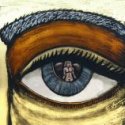
[ The holiday of Purim begins Wednesday, February 28th at sundown this year... ]
02.20.18 (Adar 5, 5778) The Sabbath that precedes the holiday of Purim is called Shabbat Zakhor - the "Sabbath of Remembrance." The maftir (additional reading) instructs us to "remember" (i.e., zakhor: זָכוֹר) how the nation of Amalek attacked the Jews at Rephidim immediately following the Exodus from Egypt (see Exod. 17:8-16). After Israel routed the attack, God told Moses, "Write this as a memorial in a book and recite it in the ears of Joshua, that I will utterly blot out the memory of Amalek from under heaven" (Exod. 17:14). Moses later explained that Amalek did not fight using conventional methods of war but rather attacked and killed the weakest members of Israel, "those who were lagging behind" in the camp (Deut. 25:17-19). This cowardly approach represented the first attack of God's newly redeemed people, a Satanic assault that God vowed never to forget.... Amalek therefore embodies satanic forces arrayed against the people of God.
Note that the name "Amalek" (עֲמָלֵק) begins with the letter Ayin (symbolizing the eye) and equals 240 in gematria -- the same value for safek (סָפֵק), the Hebrew word for doubt. Amalek therefore suggests "the eye of doubt," or even "the severed eye" (the Hebrew verb מָלָק means "to chop" or "sever" in reference to the "eye" of Ayin). Amalek therefore represents spiritual blindness as it acts in the world...
The additional Haftarah portion (1 Sam. 15:2-34) speaks of how King Saul later failed to "devote to destruction" the evil tribe of Amalek -- a mistake which cost him the kingship of Israel. Samuel's rebuke of Saul's compromise is always timely: "Behold, to obey is better than sacrifice, and to listen than the fat of rams.... Because you have rejected the word of the LORD, he has also rejected you from being king."
These two readings were selected before Purim because Haman was an "Agagite" (Esther 3:1), i.e., a direct descendant of Agag, the king of Amalek (whom Saul nearly spared, see 1 Sam. 15:32-33), and we should therefore link the 'wiping-out' of Haman with the 'wiping-out' of Amalek. The spiritual war between the light and the darkness admits of no compromise. For more information about this Sabbath, click here.
King David and the Mishkan....

02.19.18 (Adar 4, 5778) Though Moses was instructed to make the Tabernacle according to the "pattern" revealed at Sinai (Exod. 25:9,40), King David -- by direct revelation of the Holy Spirit -- later changed the size of the Tabernacle and its vessels, made additions to the original design, and even changed the priestly order of service itself (see 1 Chron. 28:11-20). King David's vision shows us that both the structure and service of the Tabernacle were provisionally intended to give physical expression to a deeper spiritual reality, and indeed the New Testament calls the service of the Temple "a copy and shadow (ὑποδείγματι καὶ σκιᾷ) of the heavenly things" (Heb. 8:5). But what were these heavenly things if not the ministry of Yeshua as our High Priest of the New Covenant? The New Covenant (בְּרִית חֲדָשָׁה) is called a "better covenant based on better promises" (Heb. 8:6), that was "not like the covenant that I made with their fathers on the day when I took them by the hand to bring them out of the land of Egypt" (see Jer. 31:31-33). Our Scriptures comment: "In speaking of a new covenant, he has made the first one obsolete, and what is becoming obsolete and growing old is ready to vanish away" (Heb. 8:13). Likewise we read, "When Messiah appeared as high priest of the good things that have come, then through the greater and more perfect tabernacle (not made with hands, that is, not of this creation), he entered once for all into the holy places, not by means of the blood of goats and calves but by means of his own blood, thus securing an eternal redemption" (Heb. 9:11-12). The earlier Levitical priesthood and its sacrificial system was "a shadow (σκιᾷ) of the good things to come, and not the true form (i.e., substance) of these realities" (Heb. 10:1).
For more on this, see "King David and the Mishkan: Further Thoughts on Terumah."
The Reality of Truth...
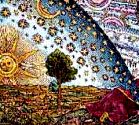
02.19.18 (Adar 4, 5778) "Let them make me a mikdash ("holy place," "sanctuary"), that I may dwell in their midst" (Exod. 25:8). Though this verse refers to the physical mishkan (i.e., "Tabernacle"), it more deeply refers to the duty of the heart to sanctify the Name of God and bring a sense of holiness to the inner life. This requires that we focus the mind and heart to honor the sacredness of life, taking "every thought captive" to the truth of God in Messiah (2 Cor. 10:5). Since our minds and hearts are gateways to spiritual revelation, we must be careful to not to abuse ourselves by indulging in sloppy thinking or unrestrained affections. God holds us responsible for what we think and believe (Acts 17:30-31), and that means we have a duty to honor moral reality and truth. There is an "ethic of belief," or a moral imperative to ascertain the truth and reject error in the realm of the spiritual. Since God holds us responsible to repent and believe the truth of salvation, He must have made it possible for us to do so ("ought" implies "can"). And indeed, God has created us in His image and likeness so that we are able to discern spiritual truth. He created us with a logical sense (rationality) as well as a moral sense (conscience) so that we can apprehend order and find meaning and beauty in the universe He created. All our knowledge presupposes this. Whenever we experience anything through our senses, for example, we use logic to categorize and generalize from the particular to the general, and whenever we make deductions in our thinking (comparing, making inferences, and so on), we likewise rely on logic. We have an innate intellectual and moral "compass" that points us to God.
Since we all necessarily must think in order to live, we should value clear thinking. This should be obvious enough, though people often make various errors and misjudgments because they devalue the effort required to carefully think through a question. As William James once said, "A great many people think they are thinking when they are merely rearranging their prejudices." When it comes to questions about the gospel, however, God regards such carelessness to be blameworthy. Again, the LORD holds us accountable for what we think and believe, especially when it comes to the reality and mission of His Son.
The truth about God is always available to human beings, if they are willing to look for it. The Divine Light that was created before the sun and the stars represents God's immanent presence that "lights up" all of creation - including our minds (Gen. 1:3). As Paul stated, "the invisible things of Him from the creation of the world are clearly seen so that people are without excuse" (Rom. 1:19-20). The heavens are constantly attesting to the reality of God's handiwork (Psalm 19:1). All of creation "shouts out" that there is a God. The Cosmological argument for the existence of a First Cause is intuitively known to be warranted.
The witness of God's truth is foundational to all of our thinking as well. If you regress far enough in a chain of reasoning, you will always encounter first principles, intuitions, axioms, and "apprehensions" of the laws of thought. This is how language works, or rather, how our mind necessarily discovers truth about reality. For example, the law of contradiction (or identity) is not discovered in experience, but is brought to experience by the operation of the mind. All reasoning is ultimately grounded on foundational first principles that are regarded as self-evident and that are known through the light of the mind itself. In other words, in order to think about anything at all we necessarily must use logic -- intuitions that we bring to our experience, and such principles are not "generalizations" derived from experience. Even the pagan Greeks understood this. For instance, Aristotle said that both deduction and induction ultimately were based on the "intuitive grasp" of first principles of thinking itself.
 |
It's important to realize that no one "invented" the rules of logic (such as the law of identity, the law of contradiction, valid rules of inference, etc.); no, these are self-evident and presupposed in all forms of intelligible thinking about anything at all. In other words, God created the mind so that true thinking is possible. If you are reading these words, you are presently using logic. You are identifying and combining letters, interpreting their meaning, making connections and comparisons, and therefore making inferences. There is no way to argue that logic is "artificial" or culturally relative. No one can consistently use logic to argue against its universal validity. The revelation (not the invention) of logical first principles is part of God's "signature," if you will, of how the mind is wired to correspond to reality. Reason discovers order in the universe but does not create it ex nihilo. If you deny this, you have opted out of the realm of thought altogether and entered the realm of the absurd.
Likewise we have intuitive awareness regarding the existence of moral truth (i.e., the standard of justice and moral law), aesthetic truth (i.e., ideals of beauty, goodness, worth, and love), metaphysical truth (i.e., cause and effect relationships), and so on. Even scientific truth is based on principles that transcend the discipline of science itself (for example, the assumption that knowledge is "good" and should be obtained is not an empirical statement). The human mind naturally uses these sorts of categories in its thinking all the time, but each of these are ultimately derived from the rational mind of God Himself.
God created people so that they could discern truth about reality. The mind functions according to logical laws because it is made in the image and likeness of God Himself... God Himself is the ground of all logic, since He created reality and structured the world to be knowable according to its laws. As it is written: "In the beginning was the word/logic (ὁ λόγος), and the λόγος was with God, and the λόγος was God" (John 1:1). God created a world that exhibits order and great beauty. And since human beings were created b'tzelem Elohim, in the image of God, our thoughts (and the words used to formulate our thoughts) as well as our actions are likewise intended to exhibit order and beauty. "For the fruit of light (καρπὸς τοῦ πνεύματος) is found in all that is good and right and true" (Eph. 5:9). Therefore "whatever is true... think on these things" (Phil. 4:8).
Followers of Yeshua are commanded to love the truth and to think clearly about their faith. The ministry of reconciliation itself is defined as "the word of truth, by the power of God, through weapons of righteousness" (2 Cor. 6:7). Indeed, the word of truth (τὸν λόγον τῆς ἀληθείας) is a synonym for the "gospel of salvation" itself (Eph. 1:13; Col. 1:5; James 1:18). We are saved by Yeshua, who is the "way, the truth, and the life" (John 14:6). God commands all people to believe this truth (Acts 17:30-31; 1 Tim. 2:4). People perish because "they refuse to love the truth and so be saved" (2 Thess. 2:10-12). Therefore we see that the issue of truth is central to salvation itself....
For more on this topic, see the article "Metanoia: Teshuvah of the Mind."
Shadows and Substance...

[ The following is related to this week's Torah reading, parashat Terumah... ]
02.19.18 (Adar 4, 5778) The Scriptures reveal that the Mishkan (or "Tabernacle") was intended to provide an elaborate "parable" or "pattern" that points to the salvation of our God (יְשׁוּעַת אֱלהֵינוּ). First, the Mishkan designated a central and sacred place (מִקְדָּשׁ) representing the Divine Presence, with the tribes carefully arrayed on each side (east, west, north, and south), and the four families of the Levites arrayed on each side of the courtyard (Num. 2). The gate to the Mishkan opened from the east, where the tribe of Judah was positioned (Gen. 49:10) and where the Kohanim (priests) had their camp just outside the court (Heb. 7:14). As you entered the Mishkan itself, you would immediately behold the mizbe'ach (i.e., copper altar), which revealed the "korban principle," namely, that the only way to draw near to God is by means of sacrificial blood offered in exchange for the sinner, as is stated in the Torah, "For the life of the flesh is in the blood, and I have given it for you on the altar to make atonement for your souls, for it is the blood that makes atonement by the life" (Lev. 17:11), and "without the shedding of blood there is no forgiveness of sins" (Heb. 9:22).
In this connection note that it is God who gives us the blood for atonement, and indeed the central (and ongoing) sacrifice on the altar was the daily offering of a defect-free male lamb along with unleavened bread and wine called "korban tamid" (קָרְבַּן תָּמִיד). The korban tamid commemorates the Lamb of God and the deeper meaning of the Passover, which the LORD called "my Offering, my Bread" (see Num. 28:1-8). Note further that the sacrifice of the lamb upon the altar was openly displayed in the courtyard, just as the cross of Messiah was a public display (John 19:16; Col. 2:14-15), though the atonement for sin was made only after the High Priest sprinkled sacrificial blood upon the covering of the Ark of the Covenant that held the testimony of the law during the Yom Kippur service. Unlike the public sacrifice of the lamb upon the altar, the Yom Kippur ritual pictures the "hidden offering" of the blood before the Throne of God in the holy of holies "made without hands," that is, the greater priesthood of the Messiah who secures for us an eternal atonement (Heb. 10). Therefore understand that the Mishkan (and later the Temple) was a provisional pattern designed by God to foretell the Substance and Reality to come, as it is written: "the Word became flesh and tabernacled with us" (John 1:14), and "when our Messiah appeared as the high priest of the good things that have come, He passed through the greater and more perfect Mishkan not made with hands (τῆς μείζονος καὶ τελειοτέρας σκηνῆς οὐ χειροποιήτου), that is, not of this creation, and entered once for all into the most holy place not by the blood of goats and calves but by his own blood, and so he himself secured eternal redemption" (Heb. 9:11-12).
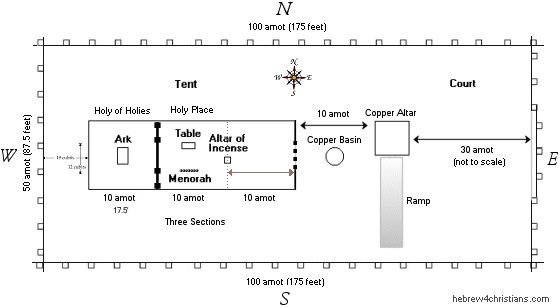 |
Note that the High Priest was required to perform the Yom Kippur avodah (service) alone, while wearing humble attire, divested of his glory, and in complete solitude: "No one may be in the tent of meeting from the time he enters to make atonement in the Holy Place until he comes out" (Lev. 16:17). The Hebrew text literally says, "no adam (אָדָם) shall be in the tent," which suggests that something more than the natural man is needed for divine intercession. And just as Moses alone approached God in the thick clouds at Sinai to receive the revelation of the Altar as mediator of the older covenant (Exod. 24:15), so Yeshua, the Mediator of the New Covenant, went through his severest agony on the cross as the darkness covered the earth (Luke 23:44; Matt. 27:45).
For more on this topic, see: "More on the Miskhan: Further thoughts on Tetzaveh."
Priests of His Light...

[ The following is related to this week's Torah reading, parashat Tetzaveh... ]
02.18.18 (Adar 3, 5778) Last week's Torah reading (Terumah) explained that God had asked for a "donation" (i.e., terumah) from the people for the sake of creating a portable, tent-like sanctuary called the Tabernacle. God then showed Moses the pattern according to which the Tabernacle and its furnishings were to be made. First the Ark of the Covenant (and its cover called the kapporet) would occupy an inner chamber called the Holy of Holies. Within an adjoining chamber (called the Holy place) a Table would hold twelve loaves of matzah and a seven-branched Menorah (מְנוֹרָה) would illuminate the tent. God gave precise dimensions of the tent with the added instruction to separate the Holy of Holies by a veil called the parochet. The entire tent was to have a wooden frame covered by colored fabric and the hide of rams and goats. Outside the tent an outer court was defined that would include a copper sacrificial altar and water basin. The outer court was to be enclosed by a fence made with fine linen on silver poles with hooks of silver and sockets of brass.
Our Torah reading for this week, parashat Tetzaveh, continues the description of the Tabernacle, though the focus shifts to those who will serve within it, namely the kohanim (i.e., priests of Israel). First Moses was instructed to tell the Israelites to bring pure olive oil for the lamps of the Menorah, which the High Priest was to light every evening in the Holy Place. Next God commanded Moses to ordain Aaron and his sons as priests and described the priestly garments they would wear while serving in the Tabernacle.
כִּי־טוֹב יְהוָה לְעוֹלָם חַסְדּוֹ
וְעַד־דּר וָדר אֱמוּנָתוֹ
ki · tov · Adonai · le·o·lam · chas·do
ve·ad · dor · va·dor · e·mu·na·to

"For the LORD is good; His steadfast love is eternal;
His faithfulness is for all generations."
(Psalm 100:5)

Download Study Card
All priests were required to wear four garments – linen breeches, tunics, sashes, and turbans, but in addition to these the High Priest (Kohen Gadol) was to wear a blue robe that was decorated with pomegranates and golden bells. Over this robe, an ephod – an "apron" woven of gold, blue, purple, and crimson – was to be worn, upon which was attached a "breastplate" (choshen mishpat) inlaid with precious stones inscribed with the names of the 12 tribes of Israel. The ephod also contained a pouch holding two unique gemstones called the urim v'tummin (אוּרִים וְתוּמִּים), usually translated as "lights and perfections." According to the Targum Jonathan, when a matter was brought to the High Priest for settlement, he would sometimes hold the urim (from אוֹר, "light") and tummin (from תָּם, "integrity" or "completeness") before the menorah and the Shekhinah would irradiate various letters inscribed on the gemstones to reveal the will of God. Finally, the High Priest would wear a golden plate (called a "tzitz") engraved with the words, "Holy to the LORD" (קדֶשׁ לַיהוָה) upon the front of his turban.

The priests were to be ordained in a seven-day consecration ceremony that involved washing, dressing, and anointing them with oil and blood, followed by the offering of sacrifices. The priests were further instructed to present burnt offerings twice a day upon the copper altar. The portion ends with a description of the Golden Altar (i.e., Altar of Incense) upon which incense was offered twice a day by the priests when the Menorah lamps were serviced. In addition, the blood of atonement was to be placed on its corners once a year, during the Yom Kippur ritual.
The Sabbath before Purim...

[ The holiday of Purim begins Wednesday, February 28th at sundown this year... ]
02.18.18 (Adar 3, 5778) The Sabbath that precedes the holiday of Purim is called Shabbat Zakhor - the "Sabbath of Remembrance." The maftir (additional reading) instructs us to "remember" (זָכוֹר) how the nation of Amalek attacked the Jews at Rephidim immediately following the Exodus from Egypt (see Exod. 17:8-16). After Israel routed the attack, God told Moses, "Write this as a memorial in a book and recite it in the ears of Joshua, that I will utterly blot out the memory of Amalek from under heaven" (Exod. 17:14). Moses later explained that Amalek did not fight using conventional methods of war but rather attacked and killed the weakest members of Israel, "those who were lagging behind" in the camp (Deut. 25:17-19). This cowardly approach represented the first attack of God's newly redeemed people, a Satanic assault that God vowed never to forget.... Amalek therefore embodies satanic forces arrayed against the people of God.
Note that the name "Amalek" (עֲמָלֵק) begins with the letter Ayin (symbolizing the eye) and equals 240 in gematria -- the same value for safek (סָפֵק), the Hebrew word for doubt. Amalek therefore suggests "the eye of doubt," or even "the severed eye" (the Hebrew verb מָלָק means "to chop" or "sever" in reference to the "eye" of Ayin). Amalek therefore represents spiritual blindness as it acts in the world...
The additional Haftarah portion (1 Sam. 15:2-34) speaks of how King Saul later failed to "devote to destruction" the evil tribe of Amalek -- a mistake which cost him the kingship of Israel. Samuel's rebuke of Saul's compromise is always timely: "Behold, to obey is better than sacrifice, and to listen than the fat of rams.... Because you have rejected the word of the LORD, he has also rejected you from being king."
These two readings were selected before Purim because Haman was an "Agagite" (Esther 3:1), i.e., a direct descendant of Agag, the king of Amalek (whom Saul nearly spared, see 1 Sam. 15:32-33), and we should therefore link the 'wiping-out' of Haman with the 'wiping-out' of Amalek. The spiritual war between the light and the darkness admits of no compromise. For more information about this Sabbath, click here.
Blessing for the Thirsting...
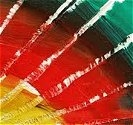
02.18.18 (Adar 3, 5778) "Let them make for me a sanctuary (i.e., mikdash: מִקְדָּשׁ) that I may dwell in their midst" (Exod. 25:8). Each of us has an inner void, a place where only God belongs. Substituting the things of this world – money, power, fame, pleasures, etc. – never satisfies our deepest thirst for life. Indeed the Lord laments: "My people have committed a double wrong: they have rejected me, the fountain of life-giving water (מְקוֹר מַיִם חַיִּים), and they have dug cisterns for themselves, broken cisterns that can hold no water" (Jer. 2:13). God is found by the thirsty soul; he is revealed wherever the heart permits him to speak. As Yeshua said: "If you had known the gift of God, and the one speaking to you, you would have asked him, and he would have given you living water" (John 4:10). Ask today.
Withstanding the Evil Days...

02.16.18 (Adar 1, 5778) When we encounter or hear news of horrific evil, it's natural for us to groan and lament, to feel indignation and outrage, and to cry out for divine justice and even retribution... As people of faith in the LORD, we profoundly feel the tension between affirming both that our loving Creator sustains all things by the word of his power (Deut. 32:4; Psalm 33:4; Col. 1:16-17, Heb. 1:3, etc.) and yet acknowledging that the ongoing depravity of human beings yields untold suffering, heartache, and pain in this world. Some people attempt to reconcile God's sovereignty despite the presence of evil by saying that while everything God does is indeed for the best (without exception), human free will is beyond God's control, and therefore God produces the best outcomes, ceteris paribus, that is, given the circumstances... "Everything is in the hands of heaven" (הכל ביד השׁמים), the sages say, "except the fear of heaven" (חוץ יראת השמים). That is, everything that happens to us is supervised by Heaven, but the choices we make are in our own hands. One implication of this view is that even though God is all-powerful or "omnipotent" (i.e., kol-yakhol: כל-יכול), he cannot literally do everything, since (for example) he cannot create a rock so large that he cannot lift it, nor can he make 2+2=5, nor can he sin, and (using similar reasoning) neither can God create a human being without giving him or her the real ability to choose both good and evil. Indeed were God to eradicate the ability for people to make genuine moral choices (by overruling their will) then he would destroy what a human being essentially is... Moreover the regular use of imperative language found in Scripture assumes personal responsibility: "ought" implies "can."
Nevertheless taking this view seriously appears to leave everything of eternal significance up to human beings and their willingness to choose to be good rather than be evil – a desperate hope if ever there was one! Moreover to say that God "permits" or "allows" the free choice of moral evil seems to suggest a sort of "divine passivity" or even a withdrawal from creation, and in fact some of the sages have said that God necessarily "empties himself" or "contracts" his presence (i.e., tzitzum: צִמצוּם) since otherwise nothing could withstand his will. So which is it? How do we resolve these sorts of dialectical tensions? Does God infallibly work all things together for good - even working through the sinful choices and depravity of humans, so that everything is in some sense "perfect" ("all is well and all manner of thing shall be well," Rom. 8:2) - or does God, who is indeed infinite in perfection (אין סוף), all-powerful and all good, "withdraw" from creation so that human beings can affect their world and shape their own destiny? Can we reasonably expect God to miraculously intervene in situations over which we have no control, such as overruling the evil choices made by others (or even ourselves), or by overruling natural evil and its consequences (such as sickness and mortal death), or is this expecting too much? When we affirm that everything God does is good we must be careful not to imply that evil doesn't "really" exist, nor may we ever impugn God's sovereign reign over all of creation, since he is indeed the Master of the Universe...
Obviously we are not going to settle the philosophical "problem of evil" here, though we need to acknowledge that we indeed do have a real problem of evil – first within our own hearts and then as a matter of theology... The blindness of the moribund postmodern world is that it refuses to see the reality of human sin and evil, choosing other "narratives" to explain away depravity and wickedness in "natural" terms, and therefore it is ineffectual and powerless to account for the radical tragedy that besets human existence. For the believer in God, however, for the person who genuinely believes in and affirms the transcendental moral and spiritual order of existence, the dialectic between God and human evil must be navigated throughout the life of faith. For instance, people are beloved and made in the image of God, yet they are fallen, ruined, and under the divine judgment; God is both infinitely transcendent, high above the ways of man, and yet infinitely immanent, intimately concerned with every hair on our heads and every breath we take... The LORD is both here and yet not here, salvation is both complete and yet to be fulfilled, we have eternal life yet we will die; we live in a shadowy world of flux, seeking the "real world" in a heavenly realm, and so on. In other words we live in an "already-not-yet" state of redemption. Our best moments are beset with shadows; our darkest are limned with hope of the new eternal day to come. Holding fast to God in the midst of this ambiguity is a soul-building venture that helps us acquire the precious middah (quality) of patience. As Yeshua said, "In your patience (ὑπομονή) possess your souls" (Luke 21:19). In light of this great existential need, James the Righteous admonished us to ask God for wisdom grounded in faith: "Count it all joy, my brothers, when you meet trials of various kinds, for you know that the testing of your faith (τὸ δοκίμιον ὑμῶν τῆς πίστεως) produces endurance. If any of you lacks wisdom, let him ask God who gives generously to all without reproach, and it will be given. But ask in faith, without doubting, for the person who doubts is like a wave of the sea that is driven and tossed by the wind. For that person must not suppose that he will receive anything from the Lord; a double-minded soul (δίψυχος) is unstable in all his ways" (James 1:5-8).
As I've mentioned before over the years, what's important regarding these harrowing matters is finding consolation and strength. In times of severe testing people often do not need further teaching, but rather "endurance," or what the New Testament calls hupomone (ὑπομονή), a word that means "remaining [μένω] under [ὑπο]" the Divine Presence while being tested. Hurting people do not need moral platitudes from others, but only the will to believe, the resolution to stay constant, and to ability breathe out simple prayers for help to the LORD: "God have mercy..." "Help me, O God..." "I need Thee, O Lord..." When we receive grace to faithfully suffer, we hear the Spirit whispering back to us: "Be not afraid..." "Live in me..." "Walk in the light..." "I am with you always..." "You are loved..."
The reason for what happens in our lives is often (always?) beyond our understanding, yet the righteousness of God's plan – even if undisclosed to us - must be accepted by faith. As it says: "As the heavens are higher than the earth, so are my ways higher than your ways and my thoughts than your thoughts" (Isa. 55:9). The refusal to accept what cannot be understood is to worship the powers of the mind, and to elevate the role of human reason above even God Himself. Faith accepts God's goodness and trusts in his care, even if that means we find ourselves walking in the dark: "Let him who walks in darkness and has no light trust in the name of the LORD and rely on his God" (Isa. 50:10).
מִי בָכֶם יְרֵא יְהוָה שׁמֵעַ בְּקוֹל עַבְדּוֹ
אֲשֶׁר הָלַךְ חֲשֵׁכִים וְאֵין נגַהּ לוֹ
יִבְטַח בְּשֵׁם יְהוָה וְיִשָּׁעֵן בֵּאלהָיו
mi · va·khem · ye·rei · Adonai · sho·mei·a · be·kol · av·do?
a·sher · ha·lakh · cha·she·khim · ve·ein · no·gah · lo?
yiv·tach · be·Shem · Adonai · ve·yi·sha·en · be·lo·hav

"Who among you fears the LORD and obeys the voice of his servant?
Let him who walks in darkness and has no light
trust in the Name of the LORD and rely on his God."
(Isa. 50:10)

Trusting in God (in Hebrew, bittachon - בִּטָּחוֹן) does not mean that we are obligated to affirm that this is "the best of all possible worlds," though it does mean we believe that eventually God will wipe away every tear and make all things right... Bittachon is a word for this world, which says, "Though he slay me, I will trust in him..." Those who call upon the LORD can trust not only in concealed good behind ambiguous appearances ("all things work together for good") but also in a future, real, substantive good that will one day be clearly manifest for us all... We fight the "good fight" of faith, which is a worthy struggle that eventually is realized for blessing. Meanwhile, may the LORD our God keep us from such depth of sorrow that leads to sickness, darkness and despair.
If you ask for bread, your heavenly Father will not give you a stone... The sages call this a kal va'chomer inference (i.e., קַל וְחמר, "light and weighty"), namely, that if a light condition is true, then a heavier one is certainly true... Yeshua used this kind of reasoning all the time: If God cares for the needs of the birds of the air, how much more (kal va'chomer) will he care for your needs? (Matt. 6:26). If God so clothes the grass of the field, how much more (kal va'chomer) will he clothe you (Matt. 6:30)? If your heavenly Father knows the number of hairs on your head, surely he knows the state of your soul. And if God wants us to walk in righteousness, kal va'chomer does he want us to know his love... Only God can give to us the love for him that he fully knows we so desperately need; only God can deliver us from our "disordered loves" to take hold of what is truly essential. All we can do is ask, and keep on asking - even as we struggle on, despite ourselves - until we begin to understand what we really need. It's as if we are constantly being asked, "Is this what you want?" and our choices confess the truth of what we believe... Only God does the miracle of real change within the human heart - only God can give life from the dead!
I once heard the following statement: "The optimist believes that this is the best of all possible worlds; the pessimist believes the optimist is right..." The facts remain the same for both, but what is different is something within the heart, something that moves the will to no longer recoil from the world but rather to accept it.... Faith is a type of courage, a willingness to take risks, even in the midst of ambiguity. It surrenders to God's plan and will, even if that plan makes no rational sense at the moment. Of course it is intellectually "safer" to abstain from such trust and to yield to a "hermeneutic of suspicion." It is woefully easy to play the skeptic, to toy with ultimate questions, to affect intellectual superiority -- but at what cost? Is the supposed "defense" against being mistaken more important the risk of commitment? But such an approach to life is a essentially a form of cowardice. Without risk, we would never marry, have children, or take hold of our dreams. Some people might dismiss the dream of God's love as nonsense and futility, but the Scriptures make it clear that such hope represents the very substance (ὑπόστασις) of our faith (Heb 11:1).
Dear friends, may you be strong in the LORD and in the power of His might, taking the "whole armor of God" so that you can withstand in the evil day, and having done all, to stand (Eph. 6:11-18). Shalom and may you have peace in the truth of God.
The Place of God...
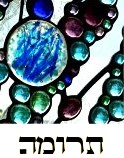
02.16.18 (Adar 1, 5778) "Let the people make me a sacred place (מִקְדָּשׁ) that I may dwell in their midst" (Exod. 25:8). But what is this other than heartfelt and earnest prayer? The materials of the sanctuary come from "freewill offerings" (נְדָבוֹת), which derive from the inner yearning of the soul... We offer our hearts up to God, and the Lord, in his great mercy, fills us with faith, hope, and love. Our spiritual need for God is his habitation with us; our hunger and thirst for healing and life is a gift from heaven (Matt. 5:6). Our blessed desperation impels us to pray because we cannot help praying. As Abraham Heschel once said, "prayer is more than a light before us; it is a light within us." At its deepest level, prayer is not about asking but receiving; it is not so much appealing to God as it is allowing God to appeal to us. As John Bunyan once wrote, "Rather let thy heart be without words than thy words be without heart." Amen. Adonai sefatai tiftach (אֲדנָי שְׂפָתַי תִּפְתָּח) "O Lord, open my lips," ufi yaggid tehilatekah (וּפִי יַגִּיד תְּהִלָּתֶךָ), "and my mouth will declare your praise" (Psalm 51:15).
אֲדנָי שְׂפָתַי תִּפְתָּח
וּפִי יַגִּיד תְּהִלָּתֶךָ
Adonai · se·fa·tai · tif·tach
u'fi · yag·gid · te·hil·la·te·kha

"O Lord, open my lips,
and my mouth will declare your praise"
(Psalm 51:15)

Amen. "For You are holy, dwelling among the praises of Israel" (Psalm 22:3).
Being Rich toward Heaven...

02.16.18 (Adar 1, 5778) In the Torah we read: "Take for Me an offering…" (Exod. 25:2). The midrash says that this teaches that if you give tzedakah (charity) to those in need, you take God to yourself, as it is written: "For the LORD stands to the right of the needy" (Psalm 109:31), and "Whoever is generous to the poor lends to the LORD, and he will repay him for his deed" (Prov. 19:17). It may seem counter-intuitive to carnal and worldly reasoning, but when you give to others, you will receive even more in return (Mal. 3:10). Indeed the person who seeks treasure for himself is not rich toward God, since we can only keep what we give away in kindness (Luke 12:21). As our Lord taught: "Give, and it will be given to you. Good measure, pressed down, shaken together, running over, will be put into your lap. For with the measure you use it will be measured back to you" (Luke 6:38).
מַלְוֵה יְהוָה חוֹנֵן דָּל
וּגְמֻלוֹ יְשַׁלֶּם־לוֹ
mal·veh · Adonai · cho·nen · dal
u·ge·mu·lo · ye·sha·lem-lo

"Whoever is generous to the poor lends to the LORD,
and he will repay him for his deed"
(Prov. 19:17)

"Take for me an offering..." (Exod. 25:2). The Torah here indicates that the LORD is our great Kohen Gadol (High Priest), for He asked for terumah (an offering or contribution) just as the earthly kohen was given terumah from the yearly yields of the farmers. Shabbat shalom!
Gift of the Heart...
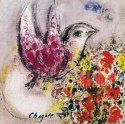
02.16.18 (Adar 1, 5778) The Hebrew word "terumah" (תְּרוּמָה) means "a gift" which the Israelites were asked to give for the building of the Tabernacle (i.e., the Mishkan, or the symbolic presence of God revealed at Sinai). The gifts needed for "building a dwelling place" were to be given out of love, not from a grim sense of duty...
A maxim in the Mishnah (Avot 1:2) affirms that the practice of benevolence is an integral part of spiritual life: "Simon the Righteous was from the remnant of the Great Assembly. He used to say: 'On three things the world stands: On the Torah; on service to God (avodah); and on acts of lovingkindness (gemilut chasadim).'" According to Jewish tradition, just as a chair requires at least three legs to function, so we must engage in the study of Scripture, serve the LORD "with all our hearts," and truly love another. Please notice that each of these "pillars" may be found in the (earlier) writings of the New Testament. For example, we are called to study the Scriptures (Acts 17:11, 2 Tim. 2:15); we are called to serve and love God (Matt. 4:10, 6:24, 1 Thess. 1:9, 2 Tim 1:3), and we are called to love one another (John 13:34-35, John 15:17, Rom. 12:10, 13:8, etc.). Indeed the Torah of Messiah (תּוֹרַת הַמָּשִׁיחַ) is the path of sacrificial love and gemilut chasidim (Rom. 13:8-10, Gal. 5:14, 6:2).
Practicing compassion is the underlying motivation for adherence to all of God's commandments, for without the inner motivation of love, there is little point to anything else the Torah might say. After all, the two great commandments of Scripture center on loving God and loving others as ourselves (see Deut. 6:4-6; Lev. 19:18; Mark 12:29-31). The underlying problem, however, is not understanding our obligation to love, but rather finding the will to truly do so.... If we have trouble keeping the central and greatest commandment, we need to first confess the truth seek Divine Help (Heb. 4:16).
For more on this topic see: "Gemilut Chasadim: Further thoughts on Terumah."
Mystery and Mercy...

[ The following is related to this week's Torah reading, parashat Terumah... ]
02.16.18 (Adar 1, 5778) In our Torah portion for this Shabbat (i.e., parashat Terumah), God provides instructions about creating the great "Ark of the Covenant" (אֲרוֹן בְּרִית־יְהוָה). Note that the Hebrew text says "they shall make an ark of acacia wood" (Exod. 25:10). Unlike other furnishings of the Tabernacle that were made by Betzalel, the text uses the plural verb here: "they shall make an ark" (וְעָשׂוּ אֲרוֹן), which implies that every person had a part in upholding the Torah. More - each person had a part in the place of blood atonement offered upon the kapporet - the cover of the Ark - which again symbolizes that Yeshua offered his life for the sins of all who would trust in him (1 John 2:2).
Note further that the Ark's dimensions were given in fractional measurements, "half-cubits" used to describe its length, width, and height, as we read: "They shall make an ark of acacia wood (עֲצֵי שִׁטִּים); two cubits and a half (וָחֵצִי) shall be its length, a cubit and a half its breadth, and a cubit and a half its height" (Exod. 25:10). The sages comment that the "half-cubit" is symbolic of our fractional understanding, alluding to mystery and even paradox. "You shall overlay it with pure gold, inside and outside shall you overlay it, and you shall make on it a crown of gold (זֵר זָהָב) around it" (Exod. 25:11). The heart of the Tabernacle held the law of God, a picture of Yeshua who bore the law of God within his heart (Matt. 5:17-18). And though the Ark was made of wood from the common thorntree, it was covered inside and out with pure gold and bore a "crown" where the sacrificial blood was offered for atonement, a picture of Yeshua who clothed himself in our humanity, bore the crown of thorns, and shed his blood for our eternal atonement (Heb. 9:12).
The Month of Adar...

02.15.18 (Shevat 30, 5778) Today marks Rosh Chodesh Adar (חודש אדר), the twelfth month of the Biblical calendar (counting from the month of Nisan). The 14th day of Adar marks the festive holiday of Purim, which is always celebrated exactly 30 days before Passover (Megillah 1:4). During both Purim and Passover we celebrate God's deliverance of His people, and therefore Adar is considered one of the happiest of the months of the Jewish year. As it is written in the Talmud, "When Adar comes, joy is increased" (Ta'anit 29a). Since it is the last month of the year, Adar also marks a season of teshuvah (repentance) for us. Just as the month of Elul (i.e., the month that precedes Rosh Hashanah and the New Year in the fall [Exod. 23:16]), so the month of Adar is a time set apart to reexamine the quality our spiritual life before the start of the new year of spring.
יְהִי רָצוֹן מִלְּפָנֵיךָ יהוה אֱלהֵינוּ וֵאלהֵי אֲבוֹתֵינוּ
שֶׁתְּחַדֵּשׁ עָלֵינוּ חדֶשׁ טוֹב בַּאֲדנֵינוּ יֵשׁוּעַ הַמָּשִׁיחַ אָמֵן
ye·hi · ra·tzon · mil·fa·ne·kha · Adonai · E·lo·hei·nu · ve·lo·hei · a·vo·tei·nu
she·te·cha·desh · a·lei·nu · cho·desh · tov, · ba·a·do·nei·nu · Ye·shu·a · ha·ma·shi·ach · amen

"May it be Your will, LORD our God and God of our fathers,
that you renew for us a good month in our Lord Yeshua the Messiah. Amen."

Download Study Card
Vision and Exile...
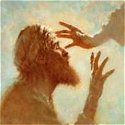
02.15.18 (Shevat 30, 5778) There is a distinction between appearance and reality, between what seems to be real and what really is real. Indeed people are often mistaken in their perceptions, believing something is true when it is later determined to be false. In the realm of everyday physical objects, for example, we regularly make assumptions about things that, upon closer inspection, are shown to be less certain. For example, we might describe a billiard ball as having a certain color or a smooth texture, but if we look through a microscope at the ball, we would see irregularities in the surface and variations in color. The ball, as we initially perceived it, does not match the new information we obtained after we've taken a closer look. Similarly, a crime might be "explained away" by appealing to socioeconomic causes or psychological categories, though upon closer inspection we begin to discern other motives, such as selfishness, malice, vindictiveness, and indeed ontological (i.e., demonic) evil.... Yesh derekh yashar lifnei ish, ve'acharitah darkhei mavet: "There is a way that seems right to a person, but in the end it is a way of death (Prov. 14:12). Wisdom bears in mind the distinction between seeming and reality, and thereby avoids quick judgments.
How we choose to see and how we interpret what we see often says more about us than it does the thing we're looking at. To those without faith in its words, the Scriptures appear as the product of a human hand, devoid of any special sanctity, and fully explainable using a set of "natural" assumptions. But to those whose eyes are "uncovered," the words of Scripture are full of glorious (and sometimes dreadful) wonders about the unseen world. The veil is pulled back and we are given a glimpse of reality and truth. In every case, however, each person is fully responsible before Eternity for what he or she chooses to believe about what is of ultimate concern and significance. No one can opt out of their answer before the bar of heaven; no one is free to disown what they choose to believe...
The Scriptures reveal that the natural world of appearance, subject as it is to constant change and decay, is ultimately unreal: "For the things that are seen are transient, but the things that are unseen are eternal" (2 Cor. 4:18). There is a spiritual world that overrules this world and to which this world will one day give account. This is the vision of the great "City of God," heavenly Jerusalem, and the final reckoning of human history. The reality of God will ultimately overmaster all other interpretations of life.
גַּל־עֵינַי וְאַבִּיטָה נִפְלָאוֹת מִתּוֹרָתֶךָ
gal · ei·nai · ve·a·bi·tah · nif·la·'ot mi·to·ra·te·kha

"Uncover my eyes that I may behold wonders from your Torah."
(Psalm 119:18)

"Uncover my eyes, that I may behold wonders from your Torah" (Psalm 119:18). We might expect our verse to read, "Uncover my eyes and I will behold wonders in your Torah," but the text actually says "from your Torah" (מִתּוֹרָתֶךָ). We read the Scriptures in order to discern God's wonders in the world around us. This is sometimes called da'at Torah (דאת תורה) – the "knowledge of Torah" that gives the correct "hashkafah" (הַשׁקָפָה) or outlook on life. Emunah (faith) reveals the hidden hand of God in all things and discloses the deceptive nature of the world of appearances. Indeed, the verb "uncover" (galah) is related to the word "captivity" (galut), suggesting that the uncovering of our eyes reveals our state of exile from our true home in heaven. "For here we have no lasting city, but we seek the city that is to come" (Heb. 13:14).
Today's religious atheists are a militant bunch (a dangerous combination), going so far as to imply that if you believe in Living God, it's a form of mental illness. "You're out of your mind! You're crazy!" The Apostle Paul answers: "If we are insane, it's for God's sake; and if we are sane, it's for yours" (2 Cor. 5:13). Those who believe in the Scriptures – whose eyes are "uncovered" – sometimes feel (and often appear) "crazy" before an insane world. After all, the world traffics in images, sound bites, fleeting sensations, and various illusions, but we testify that all such appearances ultimately answer to a higher reality. This collision is part of the "normal" life of the person who "walks by faith, not by sight" (2 Cor. 5:7).
Humility and Surrender...

02.14.18 (Shevat 29, 5778) What does "putting off the old self" (Eph. 4:22) mean if not walking in humility by confessing our need for deliverance from ourselves? We trust in God, but the life of the flesh ends with the cross. How can prayer be genuine if it focuses on the self-life rather than on newness of life? Surrender to God is a miracle, since apart from God's direct intervention, no one would ever be willing to turn to Him for life...
King David wrote, "It is good that I was afflicted (עֻנֵּיתִי), that I might learn your decrees" (Psalm 119:71). It is a great blessing to be reduced to state of weakness, of reckoning our own inner poverty, since the ego would otherwise refuse to submit to God's will. As long as any self-confidence remains, the pressure must remain. However, when God in His mercy delivers the "death blow," He strikes at the root by revealing the powerlessness of the idol to which we still cling. The sages sometimes read Psalm 118:21 as, "I thank you that you have pained me (עֲנִיתָנִי) and have become my salvation (יְשׁוּעָה)." This "mortification" of the flesh is the only way we can let go of the selfishness that makes us sick.
טוֹב־לִי כִי־עֻנֵּיתִי לְמַעַן אֶלְמַד חֻקֶּיךָ
tov · li · khi · u·ne·ti · le·ma·an · el·mad · chu·ke·kha

"It is good for me that I was afflicted,
that I might learn your decrees."
(Psalm 119:71)
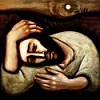
People sometimes seek healing for what needs to be slain. You don't need a cure, you need let go and allow yourself to die.... But how do we let go of our need to be in control apart from seeing ourselves in the truth? The truth shall set you free, but the truth requires that you confess your own inner poverty and brokenness (John 8:32-36). Once you see your ego for what it is - incurably weak, sinful, selfish, and so on - then you will become willing to leave its old devices in the grave (Rom. 6:6).
Dying to the self is painful, but attempting to alleviate the suffering by offering comfort to the flesh simply prolongs the agony. Being "poor in spirit" doesn't mean begging for one more taste from the "fleshpots of Egypt." The "release" from slavery to the flesh comes by the severe mercy of the LORD, as He works the miracle within us to yield to His truth. This is the "law of the Spirit of life" and comfort we are given by putting our trust in Yeshua.
The carnal life may indeed scandalized, but the point of life is not how to find healing, strength, sustenance, happiness, and so on, but rather how to give up and die. Flesh and blood can never inherit the kingdom of God. As Yeshua repeatedly taught, "Take up your cross and follow me." For "whoever finds his life will lose it, and whoever loses his life for my sake will find it" (Matt. 10:39; 16:35; John 12:25). The crucified life is ultimately the way of joyful self-forgetfulness. We are set free from the self because our hearts are focused on the surpassing love, wonder and greatness of the LORD.
You can't give away what you don't have... Life in the Spirit means trusting that God does in you what you cannot do for yourself. We can only take hold of what God has done for us by "letting go" of our own devices (Phil. 2:13). When we let go and trust, we will be carried by the "law of the Spirit of life." The way up is down, and vice-versa. The way is not trying but trusting; not struggling but resting; not clinging to life, but letting it go. We trust God for the miraculous life we have in Yeshua; we don't try to "make it happen." Trusting God means that we believe that He will take care of all that we really need...
God's way of deliverance is entirely different than man's way. Man tries to suppress the flesh, to cover it up, to justify its failings, or to enlist its power in the battle against sin, but God's way is to remove the flesh from the equation. The goal is not to make us stronger and stronger, but rather weaker and weaker, until the flesh is crucified and only the sufficiency of the Messiah remains. Then we can truly say, "I have been crucified with Messiah. It is no longer I who live, but the Messiah who lives in me. And the life I now live in the flesh I live by faith in the Son of God, who loved me and gave himself for me" (Gal 2:20). The word "Hebrew" (עִבְרִי) means one who has "crossed over" (עָבַר) to the other side, as our father Abraham did (Gen. 14:13). It is on the other side of the cross that we experience the very power that created the universe "out of nothing" (i.e., yesh me'ayin: יֵשׁ מֵאַיִן) and that raised Yeshua the Messiah from the dead.
Freedom of Self-Forgetfulness...
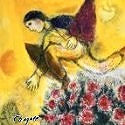
02.14.18 (Shevat 29, 5778) Surely the self is the prison that binds the soul... And he said to all, "If anyone would come after me, he must deny himself (ἀρνησάσθω ἑαυτὸν), take up his cross daily, and follow me. For whoever would save his life will lose it, but whoever loses his life for my sake will save it" (Luke 9:23-24). Note that the Greek verb translated "deny" in this verse means to forget yourself, or to quit thinking about yourself (from α-, "not," +ῥέω, "to speak"). Rather than abstaining from your carnal desires, then, denying yourself really means joyful self-forgetfulness. You are set free from the clamor of the self because your heart is focused on something so much greater and wonderful...
In light of this, we must soberly assess how much of our suffering is caused because the self, or the ego, refuses to let go and die? How much pain is produced because we do not deny ourselves but instead "remember" ourselves, thinking of ourselves first, putting our fear of loss or our desire for comfort above everything else? Is not such selfishness the essence of sin? Yeshua tells us to take up the cross and die daily because that which is dead no longer suffers from ambivalence and selfish inner conflict... There are no "half-measures" in this approach to life. If we really take up the cross and die to ourselves, our struggle with the flesh would be over. All spiritual truth leads us to this place, to the constant practice of dying to the flesh. The pain we sometimes feel is from the flesh that still clings to this life.
We need courage to let go and trust. As C.S. Lewis once said, "We are not necessarily doubting that God will do the best for us; we are wondering how painful the best will turn out to be." In light of that concern we are asked: "Do you fear that He may not be able to supply from Himself that help which He may have taken away on a human level? And why does He take human help away, except to supply you with Himself?" (Fenelon). God has to remove all that we rely upon other than Himself so that we understand that He alone is all we need. As Kierkegaard wrote, "It is terrifying when God takes out the instruments for the surgery for which no human being has the strength: to take away a person's human zest for life, to slay him – in order that he can live as one who has died to the world and to the flesh. It cannot be otherwise, for in no other way can a human being love God..." May it please the LORD to help us deny ourselves and take up the cross daily... Amen.
Light of the Servant...

[ The following is related to this week's Torah reading, parashat Terumah... ]
02.13.18 (Shevat 28, 5778) The menorah (מְנוֹרָה) symbolizes light, growth, unity, and the Tree of Life (עֵץ הַחַיִּים). All its intricate parts (i.e., its seven branches with seven lamps, nine flower blooms, eleven fruits, and twenty two cups) were formed from a single piece of pure gold (זָהָב טָהוֹר) that was "beaten" or "hammered" into shape (Exod. 25:36). This is a symbol of the divine substance (gold has a hint of the color of blood combined with the pure white). Note further that the menorah sat upon a three-legged base - a hint of hashilush ha-kadosh (the triune nature of the Godhead that is the Root of all reality). This is another image of the concept of echdut - unity in plurality found in the Torah. Just as the many parts of the Mishkan were put together to form "one Tabernacle" (הַמִּשְׁכָּן אֶחָד), and the prophet Ezekiel was told to join together two sticks to form "one tree" (עֵץ אֶחָד, see Ezek. 37:17), so the many parts of the menorah were likewise fashioned to form "one menorah" (Exod. 25:36). Moreover, the Torah itself is made up of five separate Books, but it is nevertheless one Torah, just as the children of Israel were divided into Kohanim (priests), Levites, and Israelites, though together they form one nation... Yeshua likewise taught us there would be one flock formed from both Jews and Gentiles, having one Shepherd (John 10:16).
 |
The seven lamps of the menorah were lit daily, "from evening until morning," starting from the central lamp (the shamash) and then moving right to left (Exod. 27:21). According to the Talmud (Shabbat 22b), while all the lamps received the same amount of olive oil, the "westernmost" lamp (according to Rashi, the center lamp) miraculously never ran out of oil, even though it was kindled first in the sequence. In other words, when Aaron would rekindle the lamps every evening, he found the shamash still burning, so he simply refilled it with oil and trimmed its wick. This miracle is also said to have occurred during the Temple period, though it abruptly ended about 40 years before the destruction of the Second Temple (c. 30 AD), after the death of Yeshua the Messiah, the true Servant and Branch of the LORD. As it is attested in the Talmud: "Our Rabbis taught: During the last forty years before the destruction of the Temple the lot ['For the Lord'] did not come up in the right hand; nor did the crimson-colored strap become white; nor did the westernmost light shine" (Yoma 39a).
The Scriptures declare that God is light, and Yeshua is the true Light of God (1 John 1:5; John 1:9). The light from the menorah reveals spiritual light. It was not seen from the outside of the Tabernacle, but only while inside the holy chamber, before the holy place of sacrificial atonement. The light itself came from the burning of pure and beaten olive oil - a symbol of anointing and the Holy Spirit (רוּחַ הַקּדֶשׁ). It enabled service to God to be performed, though it was not a light to be used for profane purposes. Notice that the six lamps faced the central lamp -- a picture of Yeshua, the Light of the World whose arms and legs were "hammered" for our sins.... He is the suffering servant (shamash) who lightens everyone in the world; He is the center, the supporting trunk for the other branches (John 15:5).
Hashilush HaKodesh...
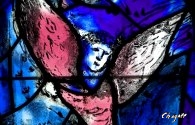
[ The following is related to this week's Torah reading, parashat Terumah... ]
02.12.18 (Shevat 27, 5778) The earthy Tabernacle and its furnishings were designed to be "signs" and "shadows" of heavenly realities (Heb. 8:5). Moses was repeatedly commanded to make the Sanctuary according to the "pattern" revealed at Sinai (Exod. 25:9,40). At the inmost center of the earthly Tabernacle, the place symbolizing utmost holiness, was the Ark of the Covenant (אֲרוֹן־הַקּדֶשׁ), a "three-in-one" box that held the tablets of the covenant. The Ark served as a symbol of kisei ha-kavod (כִּסֵּא הַכָּבוֹד), God's Throne of Glory, since it stood entirely apart as the only furnishing in the Holy of Holies (קדֶשׁ הַקֳּדָשִׁים). Upon the crown or cover of the Ark (i.e., the kapporet) were fashioned two cherubim (i.e., angel-like figures) that faced one another (Exod. 25:17-18). According to the Talmud (Succah 5b), each cherub had the face of a child - one boy and one girl - and their wings spread heavenward as their eyes gazed upon the cover (Exod. 25:20; 1 Pet. 1:12). It was here - in the midst of sacred innocence, humility, purity, and hope - that the sacrificial blood was offered to make atonement for our sins, and it was here where God's Voice would be heard (Exod. 25:22; Num. 7:89). In the very heart of the Sanctuary, then, we see the Word of God and the sacrficial blood, foreshadowing the glory of the eternal redemption secured by Yeshua. As is written in our Scriptures: "For Messiah has entered, not into holy places made with hands, which are representations (ἀντίτυπος) of the true things, but into heaven itself, now to appear in the presence of God on our behalf" (Heb. 9:24).
 |
Shrine of the Heart...
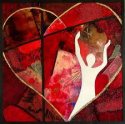
02.12.18 (Shevat 27, 5778) The sages have said that salvation may be likened to rebirth that delivers us from the "narrow places of Egypt" (i.e., from mitzrayim: -מ, "from," and צַר, "narrow") into newness of life... The first step of lasting deliverance (יְשׁוּעָה) is to receive the great revelation: "I AM the Lord your God," which begins our healing process (Exod. 20:2). We are set free from our bonds to surface appearances when we are made fully conscious of God's Presence, since we then understand everything in holy relationship with Ultimate Reality, the Ground and Source of all life (Acts 17:28). As it says in our Scriptures: "We look not to the things that are seen but to the things that are unseen: For the things that are seen are transient, but the things that are unseen are eternal" (2 Cor. 4:18). Therefore God says in our Torah, "Make for me a sacred place (מִקְדָּשׁ) so I can dwell within you" (Exod. 25:8). Each of us is created to be a "mishkan," that is, a dwelling place for God. Making a sanctuary of the heart means choosing to stay connected with reality, attuning the heart to hear the Voice of the Spirit, and consciously walking before the Divine Presence.
The Hebrew word terumah (תּרוּמָה), the name of our Torah portion, means "gift" or "contribution," which first of all refers to the decision to give of our hearts to enshrine God's Presence. We "set the LORD always before us"; we abide in the Vine and remain connected to Him (Psalm 16:8; John 15:5). It two-way partnership: we seek a home for God within our heart, we invite his Presence, so to speak, to dwell within us, and then we listen for God's invitation to come, to abide within his house and live as his beloved child (Rev. 3:20).
King David wrote, עוֹלָם חֶסֶד יִבָּנֶה / olam chesed yibaneh: "The world is built with love" (Psalm 89:2), and so indeed is God's place within our hearts... We esteem God as lovely and beautiful and wonderful and precious to us; we enshrine him and lift up our souls unto him in adoration and thanks. When we are willing to take part in the building of the sanctuary, God reveals to us "the pattern," that is, the inspiration that evidences His presence in our lives. As Yeshua said, "Let your light so shine" (Matt. 5:16).
"Knowing God is the condition for the sanctification of a human being by God's assistance and according to His intention. Wherever God is, there He is always creating... He wants to create a new human being. To need God is to become new. And to know God is the crucial thing." - Kierkegaard
Terumah - Enshrining the Presence...

[ Please note that I have created a brand new parashat Terumah audio discussion that you can download below. I hope you might find it helpful! Shavuah tov, chaverim! ]
02.11.18 (Shevat 26, 5778) The goal of the Sinai revelation was not only the giving of the Ten Commandments to the Israelites but enshrining the Divine Presence within their hearts... In our Torah portion for this week (i.e., Parashat Terumah), we read how God asked the people to offer "gifts from the heart" to create a "place" for Him: "Let them make for me a sanctuary that I may dwell in their midst" (Exod. 25:8). The Hebrew word for "sanctuary" is mikdash (מִקְדָּשׁ), which comes from the root word kadash (קָדַשׁ), "to be set apart as sacred." A mikdash is therefore a "set apart space," or a "holy place" that represents something profoundly treasured - a place of beauty and worship, a refuge, a place of rest. Other words that share this root idea include kedushah (holiness), kiddushin (betrothal), kaddish (sanctification), kiddush (marking sacred time), and so on. When God said, "Let them make for me a mikdash," then, he was inviting the people to make a sacred place within their hearts for His Presence to be manifest.... The "materials" required to make this place - gold, silver, brass, red and purple yarns, fine linens, oils, spices, precious stones, etc. - were ultimately from the heart, expressed in free-will offerings given to God.
The LORD then showed Moses the pattern (i.e., tavnit: תַּבְנִית) according to which the Mishkan (tabernacle) and its contents were to be constructed. First an ark of acacia wood was to be overlaid with pure gold inside and out. The ark was to be fitted with gold rings and gold covered poles to make it portable. The two tablets of the law were to be stored inside the ark. Two cherubim (angel-like figures) were to placed facing each other over a cover of the ark called the kapporet (i.e., "Mercy Seat"). The ark was to be housed within an inner chamber of the tent called the Holy of Holies. Adjacent to the Holy of Holies was a second chamber called the Holy Place. This chamber would contain a table overlaid with pure gold that held twelve loaves of bread along with a golden, seven-branched menorah. The Holy of Holies was separated from the Holy Place by an ornamental veil called the parochet.
The design (or pattern) of the tent along with its exact dimensions was then given. The tent was intended to be portable, with a wooden frame covered by richly colored fabric and the hide of rams and goats. The outer courtyard was to include a sacrificial altar with horns of copper set at each corner. The portion ends with a description of the outer court, which was to be entirely enclosed by an ornamental fence made with fine linen on silver poles with hooks of silver and sockets of brass.
Joy in the Valley...

02.09.18 (Shevat 24, 5778) We all need encouragement to face these difficult days... We all need "simchah" (שִׂמְחָה), that is an inner happiness or joy that comes from knowing the truth about God. Being joyful is a matter of faith for us: we must choose to believe in it and exercise emunah (אֱמוּנָה). So essential is this sense of joy that the sages have said that without it we cannot truly do teshuvah, since the goal or end of our repentance is healing and blessing and love from heaven. Yes, there is godly sorrow, but nevertheless we rejoice (שָׂמֵחַ) because the LORD God is faithful to his promises (John 14:1-3; Deut. 7:9). If you believe that, really believe that, you will experience joy, regardless of your present circumstances.....
Note that the letters of the word "with joy" (בְּשִׂמְחָה) can also spell the word "thought" (מַחֲשָׁבָה), indicating a connection between the inner life of our thoughts and our joy and well-being. Happiness or joy comes from being conscious of reality – understanding the truth – and trusting in God's love regardless of our circumstances. Gratitude is the product of joy (χαρα) obtained from the gift of being conscious of God's grace (χαρις). "Faith, hope, love: these three..." As it is written in the prophets: "For you shall go out [from your misery, your bondage, etc.] with joy (בּשִׂמְחָה), and you shall be led forth with peace" (Isa. 55:12).
Our struggles are used by God to lead us to higher ground: yeridah l'tzorich aliyah (ירידה לצורך עלייה): "Descent is for the purpose of ascent." Therefore do we die daily (καθ᾽ ἡμέραν ἀποθνῄσκω). As Yeshua taught us: "Truly, truly, I say to you, unless a grain of wheat falls into the earth and dies, it remains alone; but if it dies, it bears much fruit" (John 12:24), which means a higher realm of existence breaks forth from the extinction of the lower form that preceded it. It's by means of his being the Seed that died that we are then taken up into the bloom and life and being of His resurrection power. The life of Messiah triumphs over death, and we share in that life as we walk in the truth of his love for us. It is a mitzvah to always think the best, to trust that God works all things together for good as we make our pilgrimage through this life (Rom. 8:28). Dear friends, for the sake of your joy and strength, "think on these things" (Phil. 4:8). Amen.
כִּי־בְשִׂמְחָה תֵצֵאוּ וּבְשָׁלוֹם תּוּבָלוּן
הֶהָרִים וְהַגְּבָעוֹת יִפְצְחוּ לִפְנֵיכֶם רִנָּה
וְכָל־עֲצֵי הַשָּׂדֶה יִמְחֲאוּ־כָף
kee · ve·seem·chah · te·tzei'·oo · oo·ve·sha·lom · too·va·loon
he·ha·reem · ve·ha·ge·va·oht · yeef·tze·hoo · leef·nei·khem · ree·nah
ve·khol · a·tzei · ha·sa·deh · yeem·cha'·oo · khaf

"For you shall go out in joy and be led forth in peace;
the mountains and the hills before you shall break forth into singing,
and all the trees of the field shall clap their hands."
(Isa. 55:12)

Torah of the Heart...

[ The aim of the inner meaning of Torah (παραγγελίας) is love that issues from a pure heart and a good conscience and a sincere faith (1 Tim. 1:5)... ]
02.09.18 (Shevat 24, 5778) Our Torah reading this week (Mishpatim) begins: "Now these are the rules (mishpatim) that you shall set before them" - וְאֵלֶּה הַמִּשְׁפָּטִים אֲשֶׁר תָּשִׂים לִפְנֵיהֶם (Exod. 21:1) - which the sages say implies that the giving of the Torah is the very reason for creation of the world. God created the universe because he wanted a "dwelling place" in the hearts of people (Exod. 25:8). Indeed the climax of Torah revelation is that of the Mishkan (מִשְׁכָּן) and its altar which prefigured the incarnation of the Divine Presence in Messiah. The goal of creation was for people to know the Divine Presence, the Living Torah (התורה החיה), and to know that the LORD your God redeems you from destruction. That is why it says at the outset of the Ten Commandments: אָנכִי יְהוָה אֱלהֶיךָ אֲשֶׁר הוֹצֵאתִיךָ מֵאֶרֶץ מִצְרַיִם מִבֵּית עֲבָדִים – "I am the LORD your God who brought you out of the land of Egypt, out of the house of slavery" (Exod. 20:2). The cross of Yeshua is the central message of Torah: our redemption leads to sanctification as God's beloved, enabled by the Spirit of God to know the truth and to dwell before the Divine Presence.
Shabbat shalom and love to you all...
Compassionate Eating...
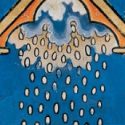
[ The following concerns this week's Torah reading, parashat Mishpatim... ]
02.09.18 (Shevat 24, 5778) "You must not eat a young animal cooked in its mother's milk" (Exod. 23:19). Apart from the rather dubious claim of the later rabbis that this verse identifies a principle of kosher law, namely, that meat and milk products should not be eaten together (something our father Abraham himself did not observe, see Gen. 18:8), the sages point out that this commandment was intended to admonish us to be humane in the way we treat animals. After all, cooking a baby animal in its mother's milk is surely a cruel thing to do, and this teaches that our diet should be centered on compassion and life, with an awareness of how our food choices affect God's creation.
The Torah states that various dietary laws were intended to sanctify the Israelites by separating them for holiness: "For I am the LORD your God. Consecrate yourselves therefore, and be holy, for I am holy (וִהְיִיתֶם קְדשִׁים כִּי קָדוֹשׁ אָנִי)... For I am the LORD who brought you up out of the land of Egypt to be your God. You shall therefore be holy, for I am holy" (Lev. 11:44-45). The realm of the holy was to be applied to the daily and routine sustenance of life. You are "to distinguish (לְהַבְדִּיל) between the unclean and the clean and between the living creature that may be eaten and the living creature that may not be eaten" (Lev. 11:47). In other words, since eating is necessarily a sacrificial act, there is a connection between holiness and what goes in (and out) of our mouths. Whenever we eat food, we incorporate other life as a means of nourishment for our own. Physical food temporarily sustains our physical life, but after it is digested we find ourselves in need of it once again. Just as God has designed the human body so that it requires ongoing sacrifice to live, so he has designed the human spirit to require lechem ha-chayim, the "Bread of Life" in order to live (Deut. 8:3).
The Name in Vain...

02.09.18 (Shevat 24, 5778) The Third Commandment states: lo tissa et shem Adonai Elohekha lashav, "You shall not lift up (lit. "carry") the Name of the LORD your God in vain" (Exod. 20:7). Note that the Hebrew word lashav (לַשָּׁוְא), usually translated "in vain" in English, means in an empty or thoughtless manner (the LXX translates it as ἐπὶ ματαίῳ, "worthlessly" or "thoughtlessly"), though the word might also be rendered as "for show," that is, insincerely or for sake of others. Obviously "lifting up the Name" of God 'lashav' includes invoking the Divine Presence in profane and vulgar ways, but it also includes "lip-service" expressions of faith, mechanical confessions, heartless acts of service, and so on. "Lifting up the Name" should never be used as a "weapon" against others, nor should it ever be used to justify or practice violence. You cannot "call upon God's Name" in the truth without first exercising genuine reverence by recognizing the sacredness of life and the LORD's all-consuming glory, love, and power...
Knowing the Name of the LORD means being in a personal, vital, and all-important relationship with the truth. The Holy Spirit is called the Spirit of Truth (רוּחַ הָאֱמֶת). This means understanding God's character as "merciful and gracious, slow to anger, and abounding in steadfast love and faithfulness, extending kindness to the thousandth generation, forgiving iniquity, transgression, and sin" (Exod. 34:6-7). Since the Hebrew idea of word (דָּבָר) is coextensive with truth (i.e., "thing"), Yeshua is called the Word of God (דְּבַר אֱלהִים) who represents the Name of God to all who trust in Him (John 17:26, Heb. 1:3). Indeed Yeshua is the true Name of God, the "substance" (being) of God, the "exact imprint and representation of His nature," and so on. "His eyes are like a flame of fire, and on his head are many diadems, and he has a name written that no one knows but himself. He is clothed in a robe dipped in blood, and the name by which he is called is 'The Word of God" (Rev. 19:12-13).
Snare of Self-Love...
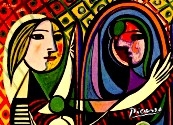
02.09.18 (Shevat 24, 5778) Regarding the commandment: "You shall have no other gods besides me; you shall not make for yourself an idol" (Exod. 20:3-4), the sages remark that we should never regard ourselves as an idol; we should never regard ourselves to be of ultimate concern... When Moses later told the people: "I stood between the LORD and you at that time for you were afraid..." (Deut. 5:5), Martin Buber commented: The 'I' stands between God and us. When a man says 'I am' [as if he were sufficient unto himself] he shuts himself off from Him. But there is no dividing wall before the one who sacrifices his 'I,' for of him it is said, 'I am my beloved's and his desire is for me' (Song 7:10). When 'I' belongs to the Beloved, then His desire is for me" (Collected Sayings).
אֲנִי לְדוֹדִי וְעָלַי תְּשׁוּקָתוֹ
ani · le'do·di · ve·a·lai · te·shu·ka·to

"I am my beloved's, and his desire is for me."
(Song 7:10)
Divine Discontent...
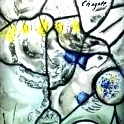
02.08.18 (Shevat 23, 5778) "Love not the world, neither the things that are in the world. If any man love the world, the love of the Father is not in him" (1 John 2:15). The life of faith represents collision with the world (κόσμος) and its philosophy of the "good life"; it protests any interpretation of "reality" that deposes or suppresses or negates the heart's need for the Divine Presence. Happy are those who "hunger and thirst" for righteousness, who refrain from this world and make themselves its exiles because of their inner heartache. For them no amount of the world's pleasures can obscure the difference between what is and what ought to be... This world is at best a corridor to the world to come, a "valley of decision" about what we ultimately choose to believe and to love... The heart of faith looks forward to "the city that has foundations, whose designer and builder is God" (Heb. 11:10).
צָמְאָה נַפְשִׁי לֵאלהִים לְאֵל חָי
מָתַי אָבוֹא וְאֵרָאֶה פְּנֵי אֱלהִים
tza·me·ah · naf·shi · le·lo·him · le·el · chai
ma·tai · a·vo · ve·e·ra·eh · pe·nei · e·lo·him

"My soul thirsts for God, for the living God.
When shall I come and appear before God?"
(Psalm 42:2)

There is a great danger to become so assimilated into this world that there is no longer any collision, no longer any protest, but merely the whimper of the soul that begs to be left alone from the general toil and troubles of this age... Conscience is seared; natural affections have been abandoned; and the "life" of the soul becomes a mere cipher, a phantom, a ghost... This is the scheme of the worldly dialectic that traps the human soul into living and dying for the sake of sheer vanity. May God help us not to so waste our days... The core prayer of the godly soul is always, "Help me, O LORD my God! Save me according to your steadfast love" (Psalm 109:26). Empty our hearts from vanity, O LORD, and afflict us with hunger and thirst for You, for you alone are what we really need....
The Decrees of Torah...

[ The following concerns this week's Torah reading, parashat Mishpatim... ]
02.08.18 (Shevat 23, 5778) The Hebrew word mitzvah (מִצְוָה) generally means "divine commandment" or "blessing" (mitzvot is the plural form), though the world alludes to "connection" with God (i.e., the root צוה means to bind or unite). The various mitzvot found in the Torah may be further divided into the subcategories of "chukkim u'mishpatim" (Deut. 4:5). Chukkim (חֻקִּים) are statutes given without a reason (i.e., divine decrees). The classic example is the decree of the Red Heifer, which, legend has it, defied even the wisdom of King Solomon. Mishpatim (מִשְׁפָּטִים), on the other hand, are laws given for a discernible reason (i.e., logical laws). An example would be the commandment to give charity or prohibitions against theft and murder. These mitzvot are inherently rational and appeal to the need for civil and moral order. The relationship between chukkim and mishpatim -- or between "faith and reason" -- is highly interdependent, however, and the sages ultimately concluded that every commandment (regardless of type) may be regarded as if it were a decree given without a reason (i.e., all "mishpatim" may be reduced to the status of "chukkim"). This is because the merely rational acceptance of "religion" is insufficient to touch the heart of faith. We do not "understand to believe," but the other way around.
A person who adjudges that it is "reasonable" to obey one commandment might later change his or her mind if their passion sways them to suddenly regard it as "irrational." No, we should obey God simply because God asks us to trust in him. We believe to understand... The great example here is the Akedah (עֲקֵדָה, "binding"), when Abraham willingly offered up his beloved son Isaac upon the altar as a sacrifice (Gen. 22:1-14). Abraham surely understood all the "commandments, decrees, and laws" of God (Gen. 26:5), but his faith led him to surrender his need to understand in devotion to the LORD. Abraham's Torah was that of faith: "And he believed in the LORD, and He counted it to him as righteousness" (Gen. 15:6). Surrendering our ego's reasoning (as absolute) by yielding to the wisdom of the LORD is the essential decree of the entire Torah....
Surrendering to God...
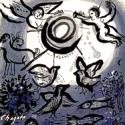
02.07.18 (Shevat 22, 5778) When our Lord Yeshua was asked, "What shall we do to do the works of God?" he replied, "Here is good news: God himself will do the work for you; you only need to believe and receive the grace and love that he gives" (John 6:29; Isa. 26:12; Psalm 68:28). The Spirit of God is called ruach (רוּחַ), the "wind" or the "breath" of God. We must learn to surrender, to relax, and to let go of our desire to control things, by trusting in God's loving presence and care (Job 12:10; Matt. 6:8; Acts 17:28, Psalm 103, Psalm 139, etc.). "The wind (ruach) blows wherever it will, and you hear the sound it makes, but do not know where it comes from and where it is going. So it is with everyone who is born of the Spirit" (John 3:8). What then shall we do to do "the works of God"? Nothing but opening your heart to his Presence, listening for the whispering wind, so that you might receive the Spirit of God (John 20:22; Zech. 4:6; Ezek. 36:26). Sin is ignoring spiritual reality, withdrawing from the touch of the Spirit, and refusing to receive God's passion for your soul...
יְהוָה תִּשְׁפּת שָׁלוֹם לָנוּ
כִּי גַּם כָּל־מַעֲשֵׂינוּ פָּעַלְתָּ לָּנוּ
Adonai · tish·pot · sha·lom · la·nu
ki · gam · kol · ma·a·sey·nu · pa·al·ta · la·nu

"O LORD, you will establish peace for us,
for You have indeed done for us all our works."
(Isa. 26:12)

Hebrew Study Card
Note that God does the work "for us" (לָּנוּ) and we are His witnesses... Salvation is "of the LORD," and is not the result of our own efforts. Anything of eternal value comes from God alone, who is the beginning and end of grace. "Not by (human) might, nor by (human) power, but by my Spirit, says the LORD of hosts (Zech. 4:6). If we lose sight of this truth, we are again made subject to the "law of sin and death" (תּוֹרַת הַחֵטְא וְהַמָּוֶת), that is, the futile principle of self-justification that constitutes the "wheel of suffering." We can escape this cycle only when we accept the truth about our condition and trust God for our deliverance. It is the "law of the Spirit of Life" (תוֹרַת רוּחַ הַחַיִּים), that is, the inner reign of the Holy Spirit, that sets us free from the reign of sin that leads to death...
וְהָיָה מַעֲשֵׂה הַצְּדָקָה שָׁלוֹם
וַעֲבדַת הַצְּדָקָה הַשְׁקֵט
וָבֶטַח עַד־עוֹלָם
ve·ha·ya · ma·a·seh · ha·tze·da·kah · sha·lom
va·a·vo·dat · ha·tze·da·kah · hash·ket
va·ve·tach · ad · o·lam

"And the work of righteousness One shall be peace;
and the service of righteousness One shall be quietness
and assurance for ever."
(Isa. 32:17)
It is written: "And the work of the Righteousness One will be peace, and the service of Righteousness One will be quietness and assurance forever" (Isa. 32:17). Note that it is the "work" (singular) of righteousness that is in view here – not the "works" (plural) of righteousness that we might perform (Titus 3:5). In other words, it is the work of the LORD alone, that is, the righteousness and glory of the Messiah, blessed be He, that gives us true peace (Psalm 37:39). Likewise the "service of righteousness" refers to the singular "avodah" of the great High Priest "after the order of Malki-Tzedek," which is the eternal service of intercession established by the inviolable will and counsel of Almighty God (Heb. 7:20-21). This avodah does not refer to acts of service performed by human beings in their religious ceremonies (i.e., the Levitical priesthood with its various forms of sacrificial worship), but rather the perfect act of service and sacrifice of Yeshua given upon the cross -- the everlasting atonement and eternal redemption secured by the greater priesthood of Yeshua (Heb. 9:12). "For our sake He made him to be sin who knew no sin, so that in him we might become the righteousness of God (δικαιοσύνη θεοῦ)." Only God through Yeshua can give us true inner peace and security forever; only Yeshua gives us peace with God.
Rules of Compassion...

[ The following is related to this week's Torah reading, parashat Mishpatim... ]
02.07.18 (Shevat 22, 5778) "If you take your neighbor's cloak in pledge, you shall return it to him before the sun goes down, for that is his only covering, and it is his cloak for his body; in what else shall he sleep? And if he cries to me, I will hear, כִּי־חַנּוּן אָנִי -- for I AM compassionate" (Exod. 22:26-27). From our Torah reading this week we are told that the "weightier matter" of compassion supersedes the rules (mishpatim) for lending to others. Expressing empathy for one who might shiver through the night is more important to God than the "letter of the law." The various Torah rules were given to test our responsibility to others. Hypocritically hiding behind the "letter of the law" is not the way of true Torah (Matt. 23:23). As Rabbi Paul said, "the goal (τέλος) of the commandment is love that issues from a pure heart and a good conscience and a sincere faith" (1 Tim. 1:5).
Note: This goes to show you that you can be "technically right" -- you can argue for the "truth" of your interest -- but you can be spiritually wrong. Spiritual truth cannot be separated from goodness and mercy...
God's Healing Truth...

02.07.18 (Shevat 22, 5778) I mentioned below that it is written in our Torah for this week (Mishpatim) to "keep far from a falsehood"" (Exod. 23:7). The Shlomo Chanoch commented: "One of the things the Messiah will do is to bring those who are far closer, and those who are close farther." This is seen in the Hebrew word for truth (i.e., emet: אֱמֶת), where the letters are far apart (i.e., Aleph [א] at the beginning, Mem [מ] in the middle, and Tav [ת] at the end), whereas the letters of the word for falsehood, (i.e., sheker: שֶׁקֶר), are all in sequence (Shin [שׁ], Qof [ק], Resh [ר]). "The first shall be last and the last shall be first." When the Messiah returns, untruth will be undone and driven apart, but the truth of God's love will bring all things together in complete healing (see Eph. 1:10).
כִּי־הִנְנִי בוֹרֵא שָׁמַיִם חֲדָשִׁים וָאָרֶץ חֲדָשָׁה
וְלא תִזָּכַרְנָה הָרִאשׁנוֹת
וְלא תַעֲלֶינָה עַל־לֵב
ki · hi·nei·ni · vo·rei · sha·ma·yim · cha·da·shim · va'a·retz · cha·da·shah
ve'lo · ti·za·char·nah · ha'rish·o·not
ve'lo · ta·a·le·nah · al · lev

"For behold! I am creating a new heaven and a new earth;
The former things shall not be remembered,
they shall not rise within the heart"
(Isa. 65:17)

Being Present before God...

02.06.18 (Shevat 21, 5778) It is easy enough to hurry past words of Scripture without slowing down to reflect on what is being said. For instance, in our Torah portion for this week (Mishpatim) we read: "The LORD said to Moses, "Come up to me on the mountain and wait there, that I may give you the tablets of stone with the law and the commandment, which I have written for their instruction" (Exod. 24:12). The Hebrew words vehyei sham (וֶהְיֵה־שָׁם), usually translated as "and wait there," can also be translated as "and be there." But why -- if every jot and tittle of Torah is indeed significant (Matt. 5:18) -- does the text say "come up to the mountain" and then add the superfluous phrase "and be there"? The sages answer that God is asking Moses to be present, be awake, and to be utterly focused – "with all your heart, soul, and might." This is to teach us that to receive God's revelation, we need to show up – "to be there" – earnestly seeking his heart."
"One must keep on pointing out that Christianity is a statement which, if false, is of no importance, and, if true, of infinite importance. The one thing it cannot be is moderately important." - C.S. Lewis (God in the Dock)
Lies and Distance...
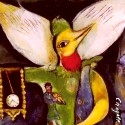
02.06.18 (Shevat 21, 5778) In our Torah reading this week (i.e., parashat Mishpatim) it is written, midvar sheker tirchak (מִדְּבַר־שֶׁקֶר תִּרְחָק), which means "keep far from a falsehood" (Exod. 23:7). This is the prescription for a good life, for being at peace with yourself. The lie is a type of violence, just as believing the lie leads to spiritual dissonance and conflict with reality. The godly soul abhors lying, since it loves the truth and understands that the LORD is the God of Truth (אֵל אֱמֶת). Indeed the Torah is called "Torat Emet," the way of truth (Psalm 119:142), and those who walk in truth practice the Divine Presence... Truth is the essence of God's Word (Psalm 119:160). As Yeshua , our Living Torah (חי תורתנו) said, "For this purpose I was born and for this purpose I have come into the world -- to bear witness to the truth. Everyone who is of the truth listens to my voice" (John 18:37).
ראשׁ־דְּבָרְךָ אֱמֶת
וּלְעוֹלָם כָּל־מִשְׁפַּט צִדְקֶךָ
rosh · de·var·ke·kha · e·met
u·le·o·lam · kol · mish·pat · tzid·ke·kha

"The sum of your word is truth,
and every one of your judgments endures forever"
(Psalm 119:160)

The Work of Faith...

02.06.18 (Shevat 21, 5778) In our Torah portion for this week (i.e., Mishpatim) we read that when the people gathered before Moses to receive the covenant, they said: "All that the LORD has spoken we will do and we will hear (נַעֲשֶׂה וְנִשְׁמָע)." Note the order: first comes the decision to obey, and then comes understanding... As Yeshua said, "If anyone's will is to do God's will, he will know," and "if you know these things, blessed are you if you do them" (John 7:17; 13:17). The heart of faith is willing to do what God asks before hearing what exactly is required. Many people operate the other way round, sitting in judgment of God's word, demanding to understand why they should obey. You cannot understand apart from trust, however, and that is categorically true of all forms of knowledge. We are to be "doers of the word and not hearers only, deceiving ourselves" (James 1:22). We don't audit the words of Scripture since we ourselves are under examination! The Scriptures demand us to respond, choose, decide. The word is like a shofar blast rousing us to action. We are to be doers, not just passive hearers. The Greek verb is emphatic: "Be doers!" (γίνεσθε) means "be born! come alive! do, live, exist before God! This is a call to creative action, to newness of life!
The Scriptures state that "if anyone is a hearer of the word and not a doer, he is like a man who looks intently at his natural face in a mirror. For he looks at himself and goes away and at once forgets what he was like" (James 1:23-24). If we just hear the truth but do not act upon it, we are comically likened to someone who carefully looks at his face in a mirror but then promptly forgets what he looks like after he steps away... Likewise those who only hear the word but do not bring it to life in their deeds forget who they are and why they were created (Eph. 2:10; Titus 2:14; Col. 1:10). When we look into the mirror of truth we see our need for teshuvah and turn to God for the healing miracle he provides (Heb. 4:12).
For more on this, see: "The Work of Faith: Further Thoughts on Mishpatim."
You shall be Sacred to Me...

02.05.18 (Shevat 20, 5778) A prophecy from our Torah portion this week (i.e., parashat Mishpatim) reads: "You shall be holy to me" (Exod. 22:31). That is, you shall be "set apart" to know and live in God's love; you shall dwell in the secret place of the Most High, a place prepared especially for you (Psalm 91:1; John 14:2). Properly understood, holiness (קְדֻשָּׁה) expresses the realm of being loved, cared for, and watched over. It is an intimacy that is exclusively hallowed and made sacred. God calls you to his closed off chamber, the "holy of holies" where He dwells; there he invites you in, he welcomes you, he desires to see you (Heb. 4:16). The deeper meaning of holiness is to be spiritually intimate with God. Hence the Spirit of Holiness uses romantic and even sexual imagery in the Song of Songs to express the deepest yearnings we have for connection with God...
Walking Uprightly...

[ The following is related to this week's Torah reading (Mishpatim)... ]
02.05.18 (Shevat 20, 5778) In our Torah portion this week we read, "Keep yourselves away from a false matter" (Exod. 23:7). In this connection note that the Hebrew word for falsehood (or lie) is sheker (שֶׁקֶר), which can be rearranged to spell kesher (קֶשֶׁר), meaning a band, gang, or group of people... The power of the lie is often found in the "group" rather than in the individual, and if enough people in a group repeat something untrue, eventually the individual's conscience will be overruled and the truth will be lost... This is a common methodology regularly employed by mass media for purposes of political propaganda.
Regarding this commandment Abraham Twerski comments that it means we should act in a way that will not move us to "hide," and that includes hiding within the anonymity of the crowd. "Think about what you are about to do. Is there a possibility that you may at some time have to deny that you did it? If so, then do not do it" (Twerski on Chumash).
Each of us must individually strive to be yashar (יָשָׁר) - upright and honest, and free from the complications and devious speech that attends to lies. We are to be "simple" (תָּמִים) with the LORD our God (Deut. 18:13), which requires that we are first willing to be rigorously honest with ourselves. "No person is saved except by grace; but there is one sin that makes grace impossible, and that is dishonesty; and there is one thing God must forever and unconditionally require, and that is honesty" (Kierkegaard).
In this connection we note that the midrash teaches that the Hebrew word for "truth" (i.e., emet: אֱמֶת) is composed of the first, middle, and last letters of the alphabet, whereas the three letters that spell "falsehood" (i.e., sheker: שֶׁקֶר) all stand next to one another. Truth creates a firm foundation, secure, strong, and trustworthy, while falsehood is unstable. As it is written, "truth stands forever, falsehood has no legs." In other words, the way of truth is "self-authenticating" and made secure, whereas the way of falsehood is "unlivewithable" and made unsteady...
Glory as Consuming Fire...

[ The following is related to this week's Torah reading (Mishpatim). Please read the Torah portion to "find your place" here. ]
02.05.18 (Shevat 20, 5778) From our Torah for this week we read: "And the appearance of the glory of the LORD (וּמַרְאֵה כְּבוֹד יהוה) was like a consuming fire (אֵשׁ אכְלָה) on the top of the mountain in the sight of the people of Israel" (Exod. 24:17). Now some people regard this fire as a threat, even a sign of God's judgment, though it is better to regard it as a sign of God's glorious passion. After all, the pillar of fire had led the people out of bondage, just as it later dwelt between the cherubim upon the Ark of the Covenant. Indeed the fire that fell upon followers of Yeshua at Pentecost was the same manifestation of the glory of God's passionate love that was revealed at Sinai. Our God is a "consuming fire" (אֵשׁ אכְלָה), which means that He is full of passion and zeal that your heart fully belongs to Him...
כִּי יְהוָה אֱלהֶיךָ אֵשׁ אכְלָה הוּא אֵל קַנָּא
ki · Adonai · E·lo·he·kha · esh · o·khe·lah · hu · El · kan·na

"For the LORD your God is a consuming fire, a zealous God."
(Deut. 4:24)

Hebrew Study Card
The metaphor of God as a "Consuming Fire" (אֵשׁ אכְלָה) connotes that He is passionately concerned with our relationship to the truth. "Therefore let us be grateful for receiving a kingdom that cannot be shaken, and thus let us offer to God acceptable worship, with reverence and awe, for our God is a consuming fire" (Heb. 12:28-29). We are promised a kingdom that cannot be shaken, wherein the Fire that consumes will consume all things that are not established by our Heavenly Father... "Know therefore today, and lay it to your heart, that the LORD is God in heaven above and on the earth beneath; there is no other. Therefore you shall keep his statutes and his commandments, which I command you today..." (Deut. 4:39-40). Our lives on the altar ascend to God in praise.
Note: I was recently reading John Bunyan's classic allegory called The Pilgrim's Progress about how a character named "Worldly Wise man" attempted to seduce Christian off the path by directing him to the "Village of Morality" to seek guidance from a man named "Mr. Legality." After Christian went to the Village of Morality and there realized his mistake, "Evangelist" appeared on the scene to chastise him for thinking that his burden could be relieved by means of the law. Though I understand Bunyan's point that we cannot find salvation by means of keeping the law, his belief that the "Law" represents only a curse is surely misleading, since it is evident that the Torah means far more mere legality and rule-following. However, a greater problem comes from Bunyan's mistaken theology of the law itself, and that is that it invites Christian to disregard the meaning and message of the Torah – indeed to flee from it – despite the fact that apart from the Torah we could have no "narrow gate" nor the righteousness of God, no salvation nor even the Cross of Messiah, since all these derive from the message of the Torah itself and not from the Sinai Covenant and its "Sefer Ha'Brit" as I explain elsewhere on this site. Moreover – and this is significant – the giving of the law does not end with the covenant to obey its terms by the people but rather with the vision of the altar – that is, with the Mishkan or Tabernacle – which enshrined the sacrificial Lamb of God who would come. By derogating the "law," as Bunyan and other Christian thinkers have done, this point is lost and the full counsel of God's word is therefore obscured. For more on this subject listen to the Shavuah Tov broadcast on parashat Mishpatim.
The Mystery of Aleph....

02.05.18 (Shevat 20, 5778) Have you considered how the Hebrew letters reveal truth about God? For example, the Hebrew letter Aleph (א) is the "father" or "king" of the Aleph-Bet, whose original pictograph represents an ox, strength, and leader. Aleph is the first letter of the first word of the first commandment of God: anokhi (אָנכִי): "I AM" (Exod. 20:2), which also designates the Name ehyeh (אֶהְיֶה) first revealed to Moses (Exod. 3:14). The numerical value of Aleph is one, indicating its preeminence, and it is a silent letter, alluding to the ineffable mystery of God's sovereign will (the related word aluph (אַלּוּף) means "Master" or "Champion"). In the Hebrew script used for writing Torah scrolls (ketav Ashurit), Aleph is constructed from two Yods (that represent "hands") joined by a diagonal Vav (that represents man). One Yod (י) reaches upward while the other reaches downward, and both extend from the "fallen" Vav (ו), picturing a "wounded Man" or Mediator (1 Tim. 2:5). In the Hebrew numbering system (i.e., gematria), Yod = 10 and Vav = 6, so adding up the three parts of Aleph yields 26, the same value as the Name of the LORD: YHVH (יהוה). The very first letter of the Hebrew Alphabet, then, pictures the three-in-one LORD who mediates all of life for our salvation. And just as there are three parts to Aleph, but Aleph is One (echad: אֶחָד), so there are three Persons to the Godhead, yet God is absolutely One. Indeed, the gematria of the word Aleph (אָלֶף) is 111 (Aleph=1, Lamed=30, and Pey=80). As Yeshua said, every "jot and tittle" of Scripture is significant...
Mishpatim - Details of the Law...

[ After the revelation of the Ten Commandments God called Moses up to Sinai again, this time for 40 days and 40 nights, to teach him the details of the commandments and how they were to be applied. The 6th section of the Book of Exodus provides a sampling of these various rules and laws (called "mishpatim" in Hebrew) that God instructed Moses during this time. ]
02.04.18 (Shevat 19, 5778) Last week we read in our Torah that exactly seven weeks after the Exodus from Egypt (i.e., 49 days after the first Passover), Moses gathered the Israelites at the foot of Mount Sinai to enter into covenant with the LORD. In a dramatic display of thunder, lightning, billowing smoke and fire, the LORD descended upon the mountain and recited the Ten Commandments to the people. Upon hearing the awesome Voice of God, however, the people shrank back in fear and begged Moses to be their mediator before God. The people then stood far off, while Moses alone drew near to the thick darkness to receive further instructions from the LORD.
In this week's Torah portion (i.e., Mishpatim) we learn about these additional instructions Moses received on the mountain. The Jewish sages traditionally count 53 distinct commandments in this portion of the Torah, easily making it one of the most "legalistic" (i.e., law-focused) sections of the entire Bible. Civil laws, liability laws, criminal laws, agricultural laws, financial laws, family purity laws, Sabbath laws, and holiday laws are all given in this portion. These various social and civil laws are called "mishpatim" (מִשְׁפָּטִים), a plural word that means "rules" or "judgments."
After receiving these additional rules, Moses descended Sinai and went before the people to reveal to them the words of the LORD. Upon hearing the details, the people responded in unison, "all the words which the LORD has said we will do" (i.e., na'aseh: נַעֲשֶׂה). Moses then wrote down the words of the covenant into a separate scroll (sefer habrit), built an altar at the foot of Sinai, and ordered sacrifices to the LORD to be made. He then took the sacrificial blood from the offerings, threw half upon the altar, and read the scroll of the covenant to the people. The people ratified the covenant by saying, "all that the LORD says we will do and obey" (i.e., na'aseh ve'nishmah: נַעֲשֶׂה וְנִשְׁמָע). Upon hearing this, Moses took the other half of the sacrificial blood and threw it on the people saying, "Behold the blood of the covenant that the LORD has made with you in accordance with all these words" (Heb. 9:18). After this ceremony, Moses, Aaron, and seventy of the elders of Israel ascended Mount Sinai to eat a "covenant affirmation meal" between Israel and the LORD.
Upon returning from the mountain with the elders, the LORD commanded Moses to go back up to receive the tablets of stone inscribed with the Ten Commandments. On the seventh day there, he heard the Voice of the LORD calling to him from the midst of the cloud of glory, and then entered into the Presence of the LORD. He remained on the mountain for a total of forty days and forty nights receiving further revelation about the Mishkan (i.e., Tabernacle) while the Israelites waited for him at the camp down below.
Shabbat Shekalim - שבת שקלים

[ This coming Sabbath is called "Shabbat Shekalim" which signals the advent of spring... ]
02.04.18 (Shevat 19, 5778) Four "special Sabbaths" occur just before the start of spring: two before the holiday of Purim and two before the holiday of Passover. Collectively, these Sabbaths are called "The Four Shabbatot" and four additional Torah readings (called Arba Parashiyot, or the "four portions") are read on each of these Sabbaths in preparation for the holidays, particularly for the central holiday of Passover. The names of these Sabbaths are Shabbat Shekalim, Shabbat Zakhor, Shabbat Parah, and Shabbat HaChodesh, respectively.
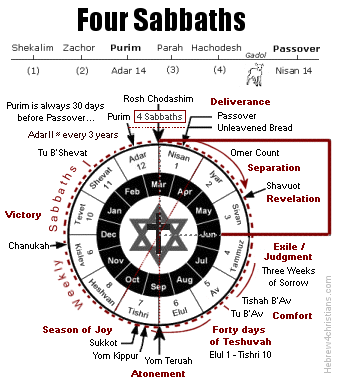 |
The first of the four Sabbaths is called Shabbat Shekalim (שבת שקלים), "the Sabbath of the Shekels," which is the last Sabbath before the month of Adar begins. An additional reading (Exod. 30:11-16) is appended to the regular Torah reading that describes the contribution of a half-shekel for the construction and upkeep of the Mishkan (Tabernacle). According to a midrash in the Talmud (Bavli, Shekalim 1), the half-shekel represents a "fiery coin" that the LORD brought from underneath the Throne of His Glory to symbolically "atone" for the sin of the Golden Calf. Since every Jew was required to give this "widow's mite," repentance is accepted for all who come in true humility before the LORD. For us, it might be a time to remember those who offer personal sacrifices so that we also might draw closer to God.
Note: Wednesday February 14th (at sundown) marks Rosh Chodesh Adar (חודש אדר), the twelfth month of the Jewish calendar (counting from the month of Nisan).
The Deeper Torah...

02.02.18 (Shevat 17, 5778) Strictly speaking the content of the Ten Commandments, from a moral perspective, presented no new revelation, since sacred Reality is intuitively understood within every created soul (see Gen. 1:27; John 1:9; Acts 17:24-28). As it is written, "The wrath of God is revealed from heaven against all ungodliness and unrighteousness of men, who suppress (i.e., hold down: κατέχω) the truth by their unrighteousness, because that which can be known about God is evident within them, for God has revealed it to them" (Rom. 1:18-19). Where Paul says, "against all ungodliness" he refers to our universal duty before the Living God (בֵּין אָדָם לָמָקוֹם); and likewise "all unrighteousness," refers to our universal duty toward other people (בֵּין אָדָם לְחֲבֵרוֹ). The "invisible things of God are seen" so vividly that people are "without excuse" (ἀναπολόγητος) for their evasion and rejection of the Divine Presence, which constitutes a disposition of rebellion, treason, and willful desecration of the sanctity of life (Rom. 1:20). The deeper revelation given at Sinai, however, was not an elaborate lawcode but something else, namely, the solution for the problem of spiritual death as prefigured in the Altar of the Tabernacle and the daily sacrifice of the lamb (i.e., korban tamid: קָרְבַּן תָּמִיד; Num. 28:1-8). "The people stood far off, while Moses drew near to the thick darkness where God was" (Exod. 20:21). The onlookers saw the outer, the imposing, the threatening, and this made them distant, but Moses entered the inner region and was given the vision of the altar (Exod. 25:9; John 5:46-47; Heb. 8:6). Likewise Yeshua did not come to be a moral teacher of the law but to bear the penalty of our lawlessness (2 Cor. 5:21; Gal. 3:13). Our Savior died upon the cross shrouded in complete darkness, yet entering the inner region reveals God's passion offered up for you (Luke 23:44-45).
Personal Update: I've been sick the last few days with a bloody nose and a lot of sinus pain, stomach and body aches, etc. Today I have begun to feel a bit better, thank the LORD, though our children are still sick over here. Thank you for your prayers for us. We send you our love and our prayers are with you all. Shabbat Shalom.
Everyday Revelation...
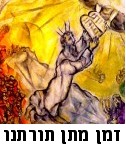
02.02.18 (Shevat 17, 5778) The Kotzker rebbe asked, "Why is Shavuot (i.e., Pentecost) called 'zman mattan torateinu,' the time of the giving of our Torah, rather than 'zman kabbalat torateinu,' the time of the receiving of our Torah? The reason is that on that momentous day at Sinai, only the giving of the Torah occurred, whereas the receiving of the Torah must take place each and every day, as it says, "Trust in the LORD 'bekhol libbekha' (בְּכָל־לִבֶּךָ) - with all your heart; and know Him 'bekol derakhekha' (בְּכָל־דְּרָכֶיךָ), in all your ways" (Prov. 3:5-6). The giving of the Torah is described as a "loud and never-ending voice" (Deut. 5:19), though it is our constant responsibility to shema – to receive the invitation of God's heart.
The Passover haggadah states, "Each person in every generation must regard himself or herself as having been personally set free from Egypt," and that liberation includes being present at the revelation of Torah at Sinai....
Faith and Loneliness...
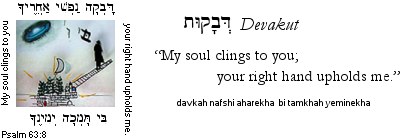
02.02.18 (Shevat 17, 5778) There is an inherent "dualism" in our spiritual consciousness wherein we are seeking an eternal happiness and ultimate good that transcends anything that may be found in this temporal world. Our faith confesses that reality itself is "two-tiered," corresponding to two different realms of existence, namely, an "upper realm" of the immaterial and spiritual (i.e., heaven) and a "lower realm" of the material and physical (i.e., the natural universe). Upon reflection we may sometimes feel lonely and bewildered in this duality, not knowing how to "mediate" or bring together the opposite poles of our experience. On the one hand life in this present world is surely fading away, and finitude, dissolution, and the "dust of death" seem omnipresent to our physical senses, nevertheless our hearts yearn for eternity, for unending life, and for the ideal of everlasting significance. We long for meaning, wonder, greatness, and the peace and peace of unconditional love, yet we find ourselves trapped within a diseased and moribund world that is filled with thwarted dreams, painful losses, harrowing vexations, and death... We hunger and thirst for real life, for salvation from our misery, but the cosmological visions of mechanistic science reveal an immense emptiness that has no goal or end, no explanation for its existence, and therefore no meaning or genuine hope..
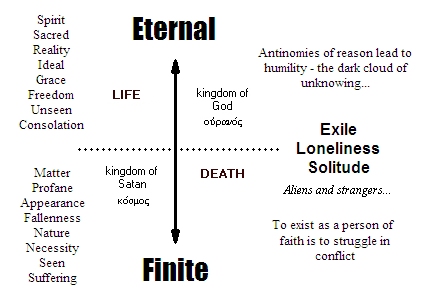 |
Ancient Greek philosophy regarded the soul (i.e., human consciousness) as "imprisoned" within the body, and therefore it advised meditating on intellectual ideals, "forms," and "essences," to transcend the chaos of fate and our natural passions. For them philosophy was really a kind of "recollection" whereby we return to the original Good that has been lost and is presently concealed by the illusion of mere appearances.
Now these ancient Greek philosophers understood the dualistic nature of reality (as far it goes), though of course the Torah had implied these matters long before the advent of Socrates, Plato, and Aristotle... After all, the Torah teaches the experience of dualism and ambiguity is by divine design. Upon earnest reflection the human heart begins to cry out for something more (Eccl. 3:11). Though we understand that we are creatures formed of the dust of the earth, we sense something of the divine within us; we inwardly hear an "echo from Eden" that reminds us of paradise lost... We shrink before our own powerlessness and insignificance yet we dare to believe in the eternal glories of love, beauty, justice, and everlasting life. We simultaneously see ourselves as both physical beings, restricted by time, history, and culture, as well as spiritual beings, transcending the fate of the natural by visions and dreams of the ideal, thereby sensing the glorious and the sacred. Neither of these "polarities" of the soul can be blended or synthesized, however, which leaves us in a state of existential tension wherein we cling to the vision of the Eternal in the midst of the fleeting shadows of this present realm (Rom. 8:4, Gal. 5:16-17).
Biblical faith refuses to "reduce" the significance, value, worth, and aspirations of the human heart into purely natural categories and terms, and therefore spiritual life constitutes a "protest" against any interpretation of reality that excludes, suppresses, denies, or minimizes the Divine Presence. Life in olam hazeh (this world) is corridor leading to the world to come. Our faith affirms that underlying "natural" phenomena is a deeper and higher reality that is ultimately real and abiding. There is an end or "telos" (goal) that sets the direction or Torah of our dualistic existence. Faith "sees what is invisible" (2 Cor. 4:18) and understands (i.e., accepts) that the "present form (τὸ σχῆμα) of this world is passing away" (1 Cor. 7:31). The heart of faith looks beyond this realm to behold a city whose designer and builder is God Himself (Heb. 11:10). "So we do not lose heart... For the things that are seen are turning to dust, but the things that are unseen endure forever" (2 Cor. 4:16-18).
It has been said that God "hides" so that we may learn to seek Him. This seeking involves all our hearts, since we will not seek God until we understand the inner crisis. It is not enough to know right words of theology, since we must learn to think the right way, and this comes at the cost of struggle, wrestling, and testing. We cannot rely on reason alone to guide us, for that relegates beauty, mystery, and hope into oblivion; nor can we dismiss reason, for then faith becomes absurd and ridiculous. We must find a delicate balance: "faith seeking understanding," knowing when it is right to question, to doubt, and to analyze, and when it is right to affirm, to submit, and to surrender. Reason is a servant of something more fundamental, namely the heart or the will; it is activated at the stir of the soul's desire.
The dualism of life shows up within our hearts as well, as we wrestle with our own faith and with "double-mindedness," that is, the ambivalence that results from not having our minds made up. On the one hand, we need to confess the truth of our radical sinfulness, our depravity, our brokenness, and so on, while on the other we must learn to know ourselves as the "beloved" and to find faith that God's blessing indeed belongs to us -- that Yeshua gave his life for us -- despite ourselves. We have to be willing to take God's new name for us and believe that God has transformed our deepest nature for eternal good. We have to be renamed from "Jacob" to "Israel," and yet we know ourselves as both... In other words, we must learn to "put on" the new nature and to "put off" the carnal reasoning of our former life. The answer for us is found in the word "miracle," as God in great mercy and compassion regenerates us, comforts us, and then guides our way back to the truth of his salvation.
הֵן־אֱמֶת חָפַצְתָּ בַטֻּחוֹת
וּבְסָתֻם חָכְמָה תוֹדִיעֵנִי
hein-e·met · cha·fatz'·ta · va·too·choht
oov·sa·toom · chokh·mah · to·dee·ei'·nee

"Behold, you delight in truth in the inward being,
and you will teach me wisdom in the secret heart."
(Psalm 51:6)

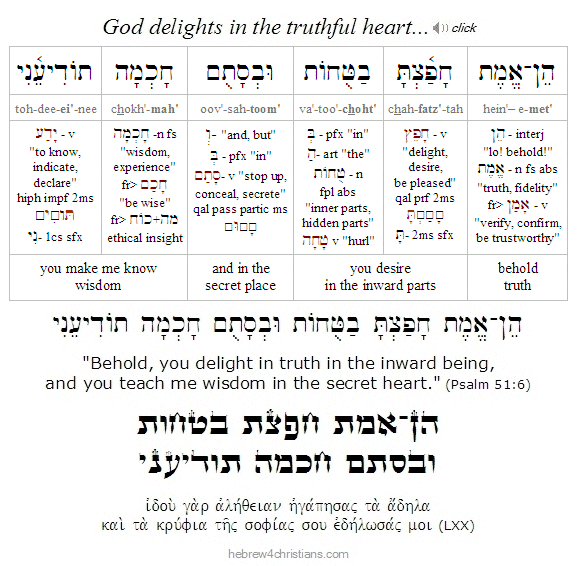
Torah of Faith...

[ The following is related to our Torah for this week, Parashat Yitro, and the giving of the Ten Commandments at Sinai in particular... ]
02.01.18 (Shevat 16, 5778) When asked how many commandments are in the Torah, most Jews will answer 613, based on Jewish tradition (the number 613 is sometimes called "taryag" (תריג), an abbreviation for the letters Tav (400) + Resh (200) + Yod (10) + Gimmel (3) = 613). Despite several attempts made over the centuries, however, there has never been a definitive list of these commandments, and of those who tried to compile such, no two agree... Some say the number 613 comes from a fanciful midrash that teaches that since there are 365 days in a year (corresponding to the 365 negative commandments) and 248 "parts" of the body (corresponding to the positive commandments), each day we should use our body to serve God. Regardless of the exact count, however, the Talmud followed the Apostle Paul by understanding all the Torah's commandments to be derived from the Ten Commandments given at Sinai, the most basic of which is the very First Commandment, namely, "I AM the LORD your God (אָנכִי יְהוָה אֱלהֶיךָ) who brought you out of Egypt, out of the house of slavery" (Exod. 20:2). This foundational commandment was later restated by the prophet Habbakuk as: וְצַדִּיק בֶּאֱמוּנָתוֹ יִחְיֶה / "The righteous person will live by faith in God" (Hab. 2:4; Gal. 3:11; Heb. 10:38). In other words, all of the commandments of God come down to your sacred duty to believe the truth of God's love: אָנכִי יְהוָה אֱלהֶיךָ.
Note: I stated that the sages of the Talmud "followed" the Apostle Paul's line of thinking on this subject since Paul wrote centuries before the Talmud was compiled... And incidentally, the New Covenant Scriptures are not without the imperatives of "Torah," of course, with some people counting over 1,000 distinct commandments in its pages...
Torah of Willingness...

02.01.18 (Shevat 16, 5778) Do you need to understand before you will believe? The midrash says that God offered the Torah to each the 70 nations, but each nation first asked to understand what was required, and then rejected the offer... Finally God approached Israel and asked: "Will you accept my Torah?" And they replied, kol asher dibber Adonai na'aseh (כּל אֲשֶׁר־דִּבֶּר יְהוָה נַעֲשֶׂה), "all that the LORD has spoken we will do" (Exod. 19:8). In other words, Israel was willing to accept the Torah even before they understood what was required of them. Later they reaffirmed their simplicity of heart by saying na'aseh ve'nishma: "We will do and then we will understand" (Exod. 24:7). Faith is first of all a matter of heart, of gratitude, and responding to God's invitation. All the "externals" of the Sinai experience - the fire, the smoke, the blasts of the shofar - were known in the deeper fire, smoke, and soundings of the heart of faith.
First we learn to trust Him, and then we learn to walk with Him... in that order.
 |
|



